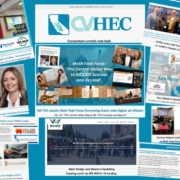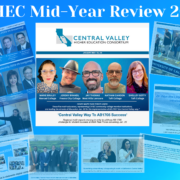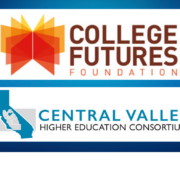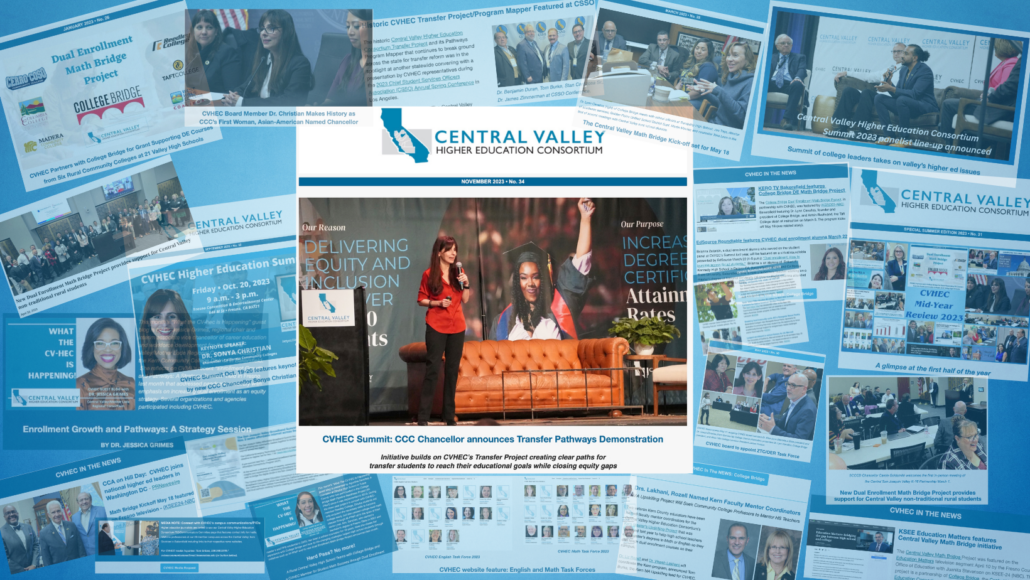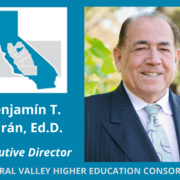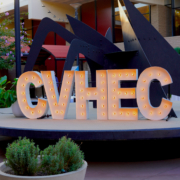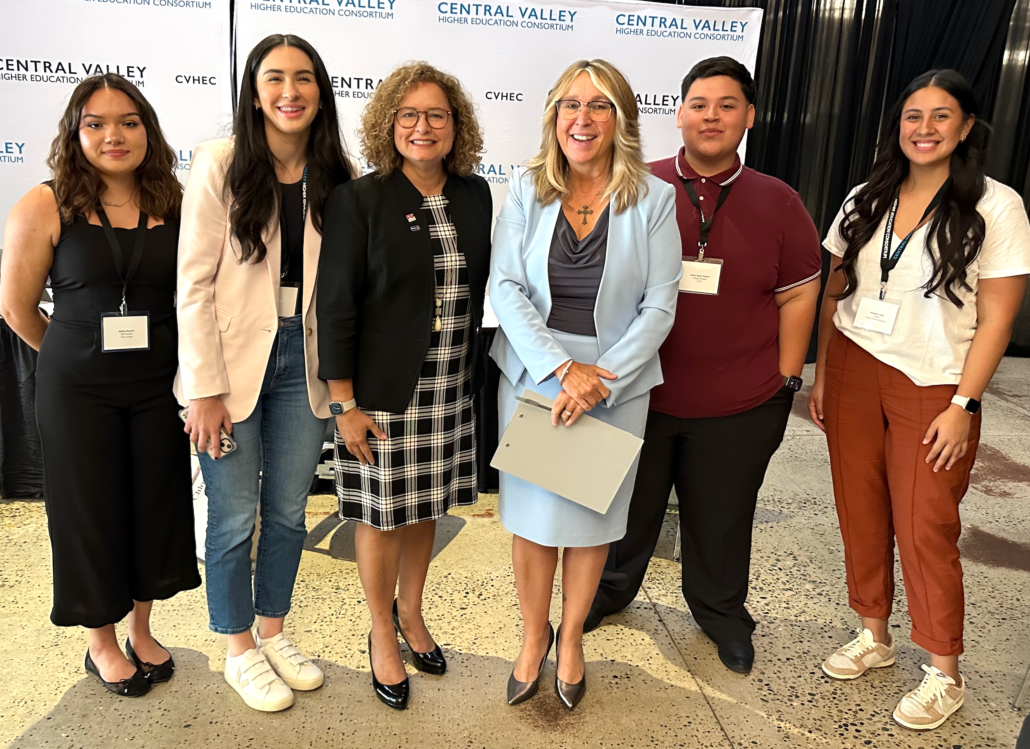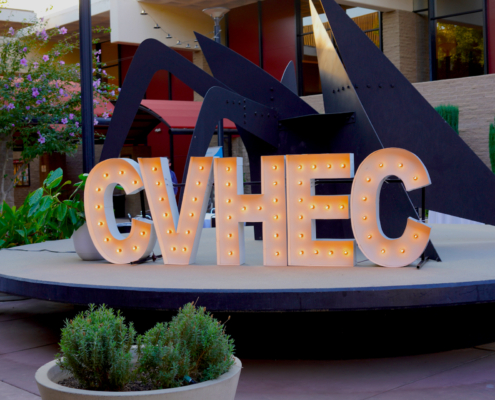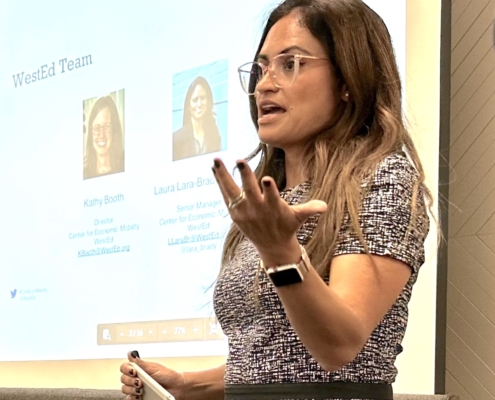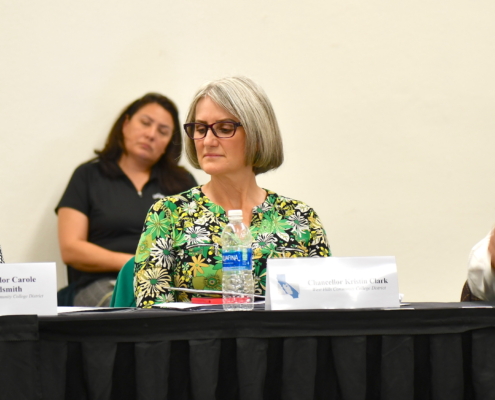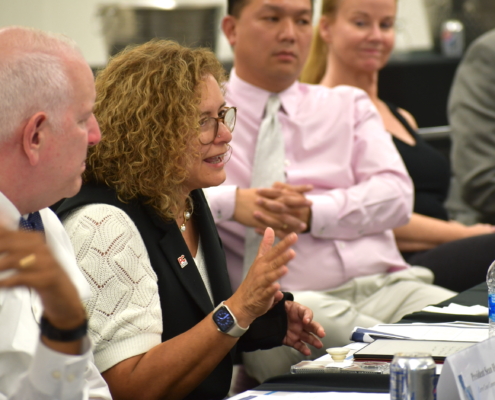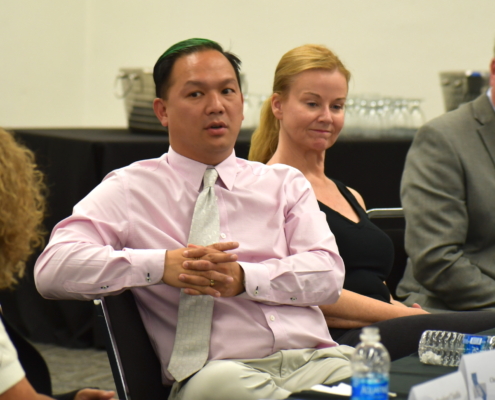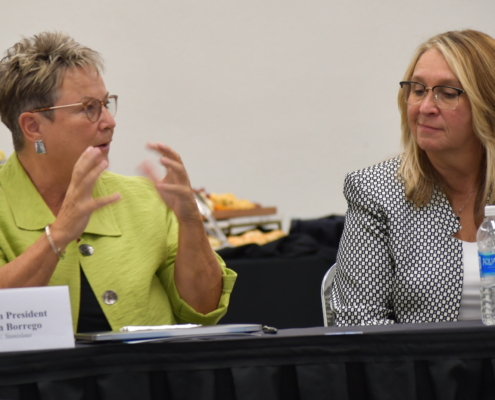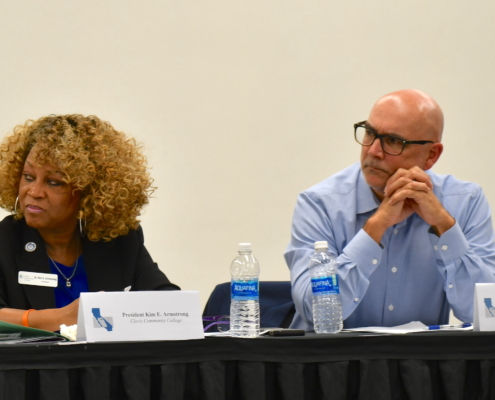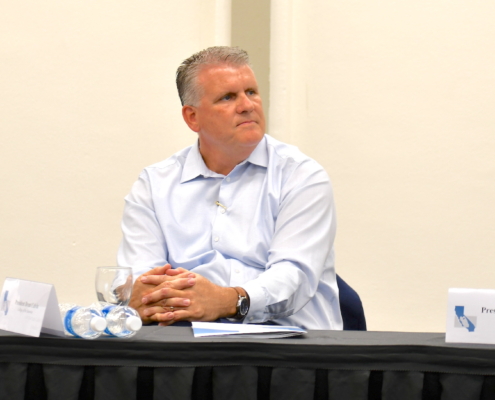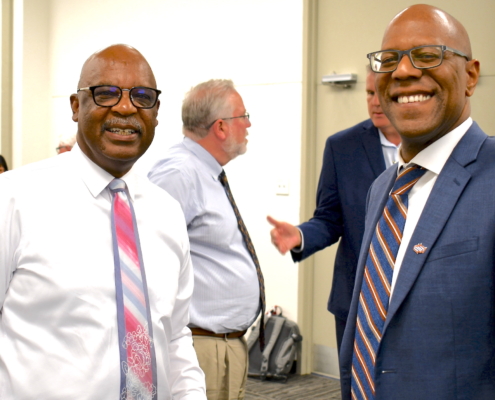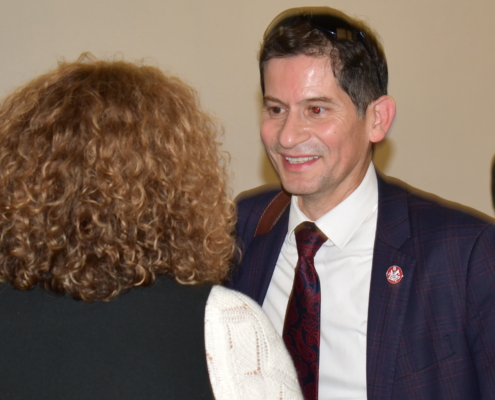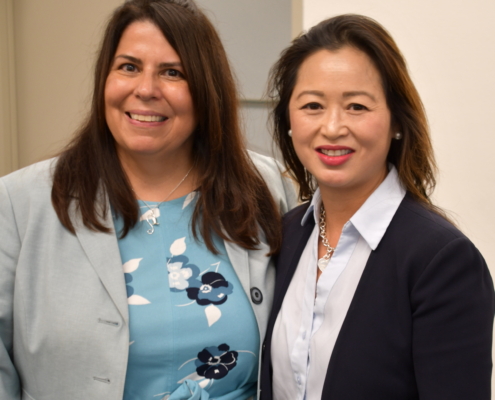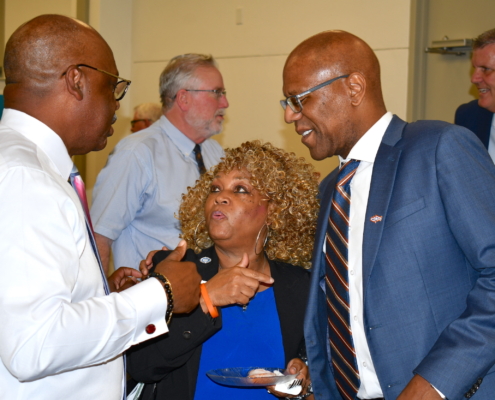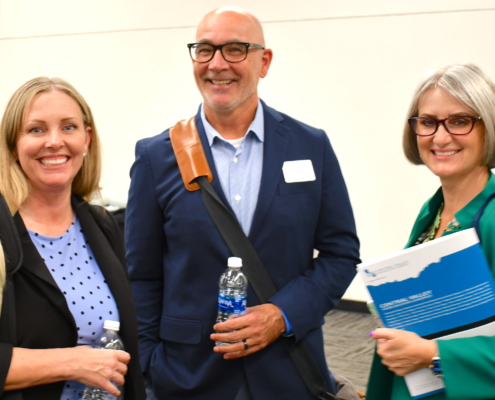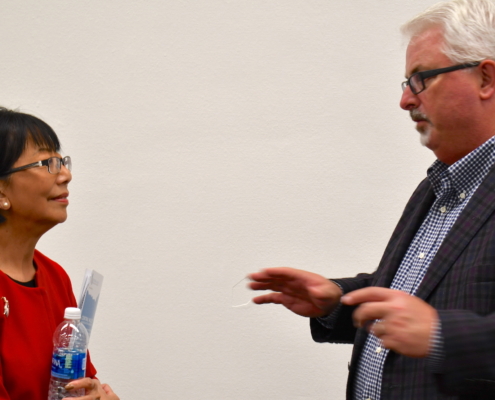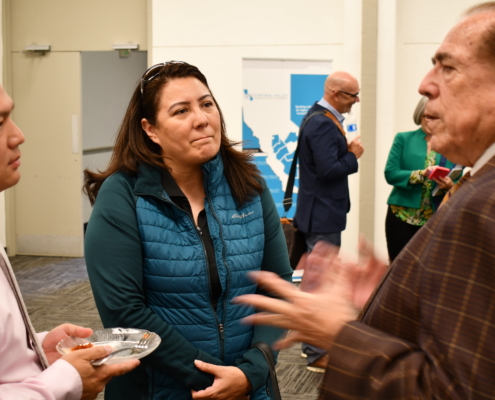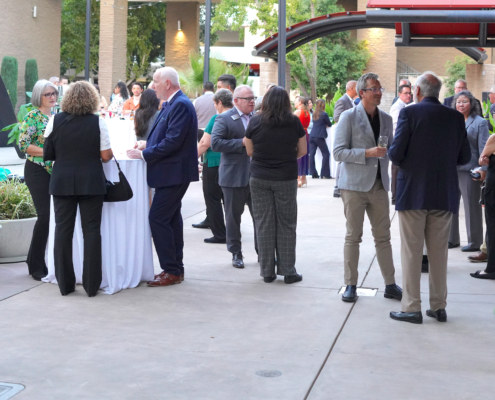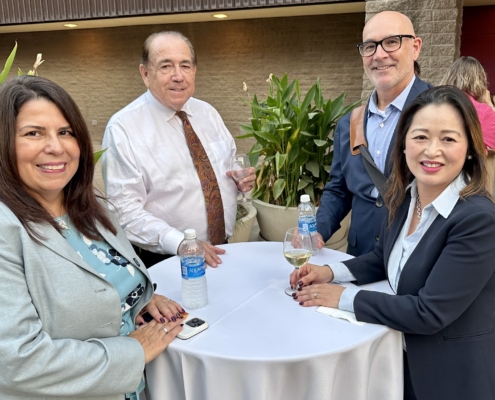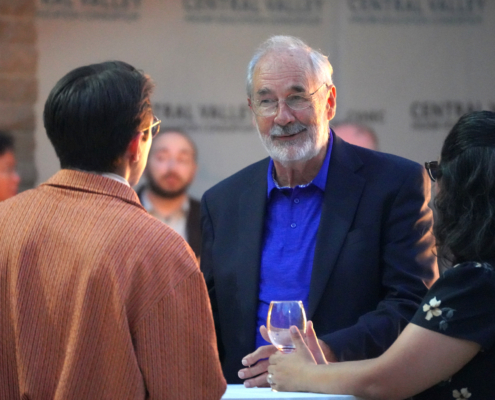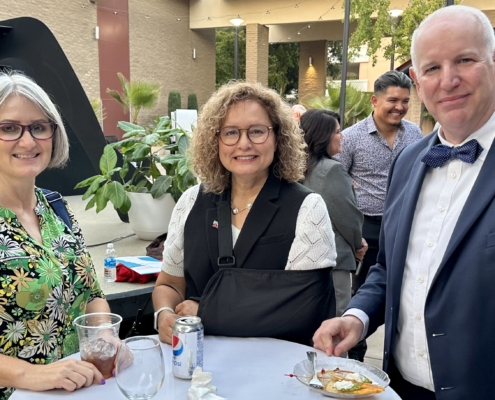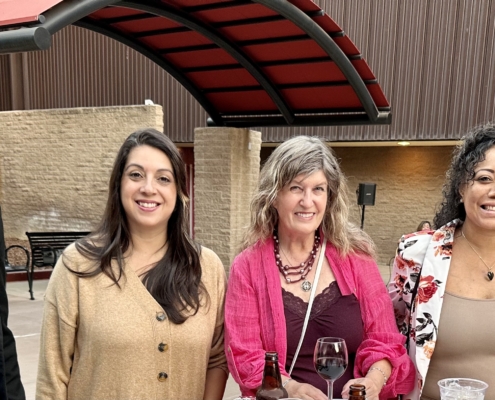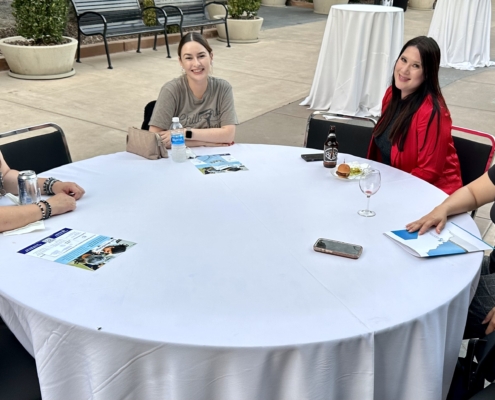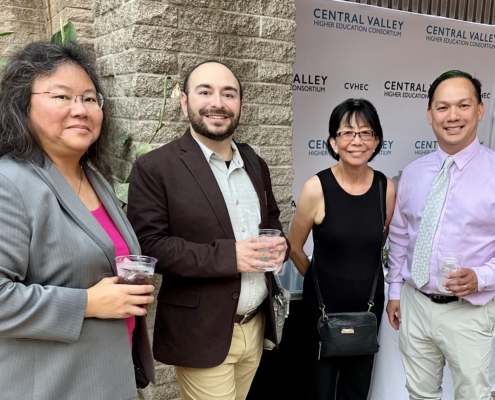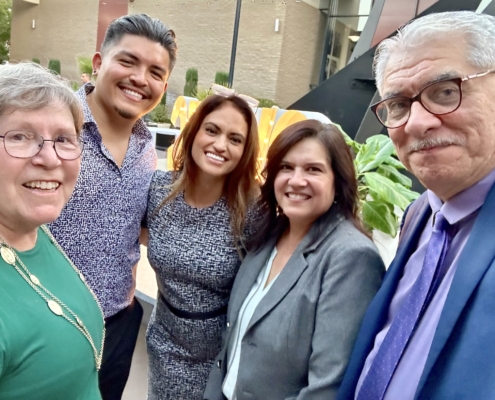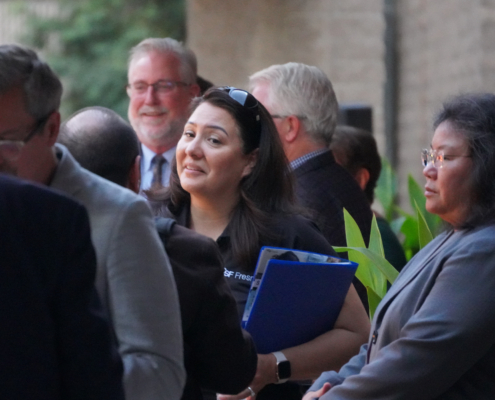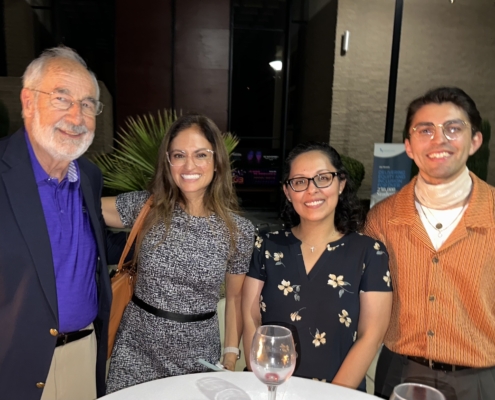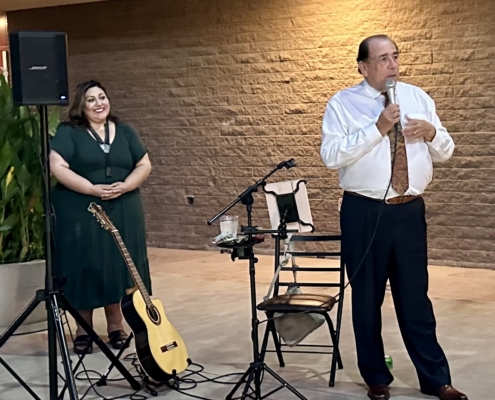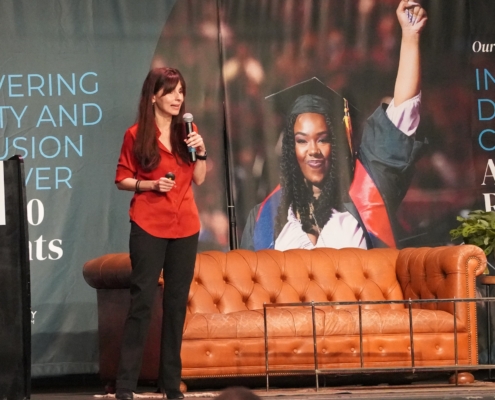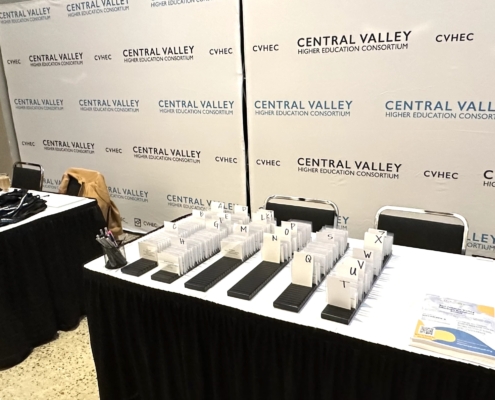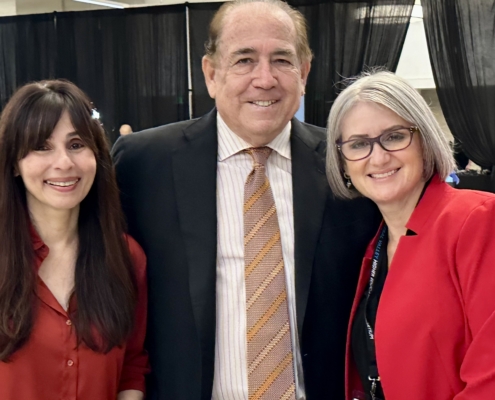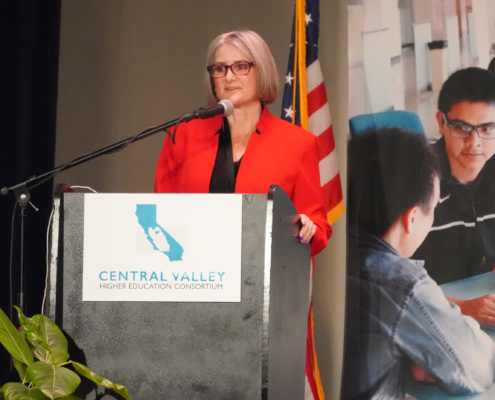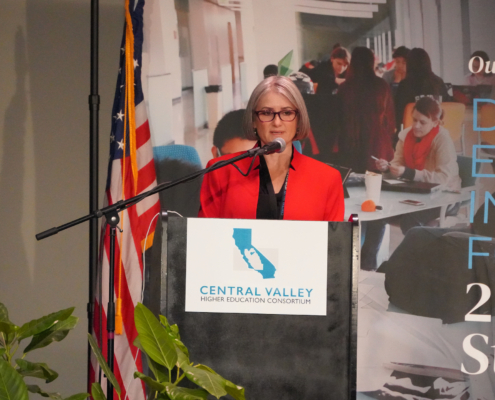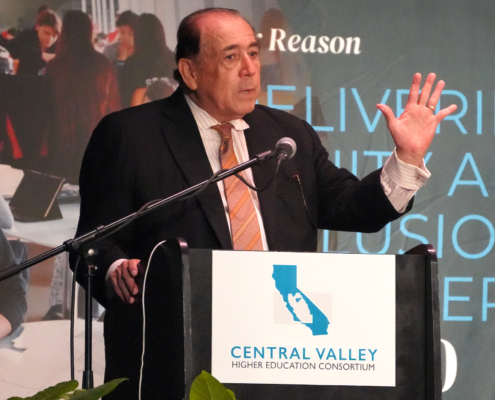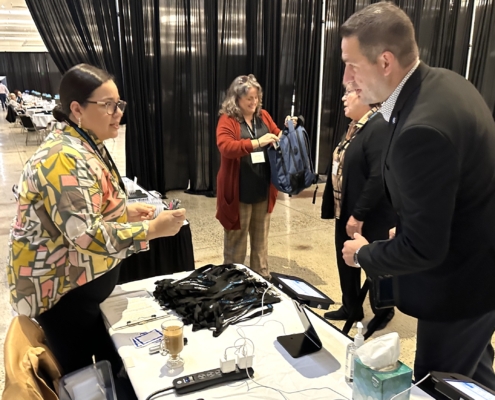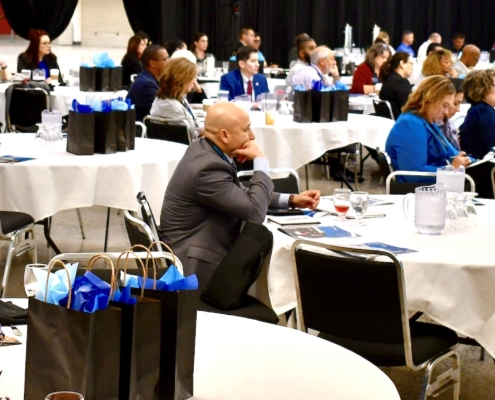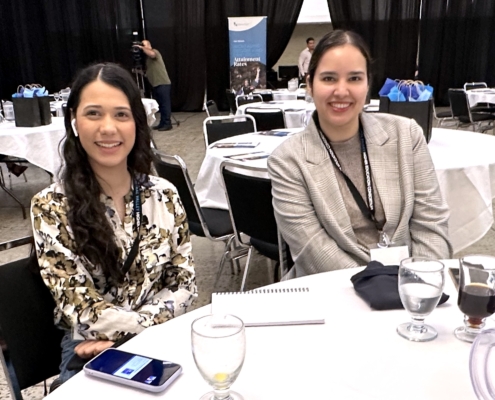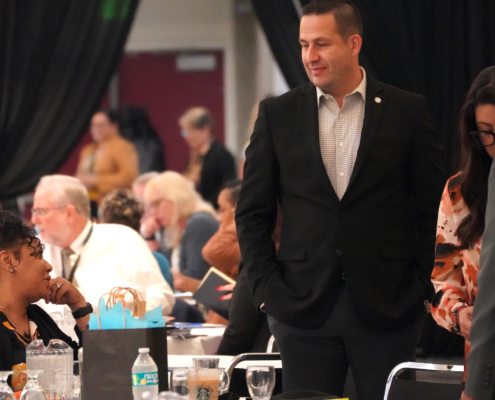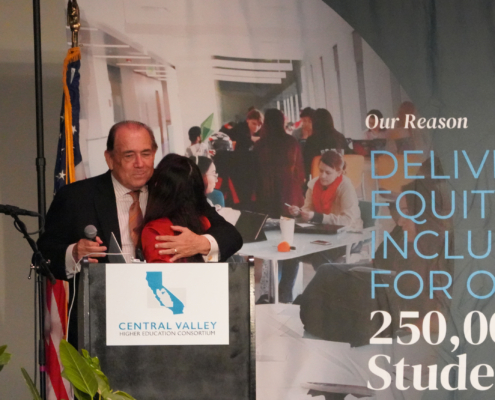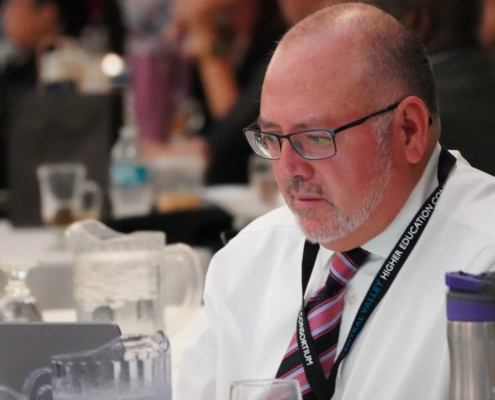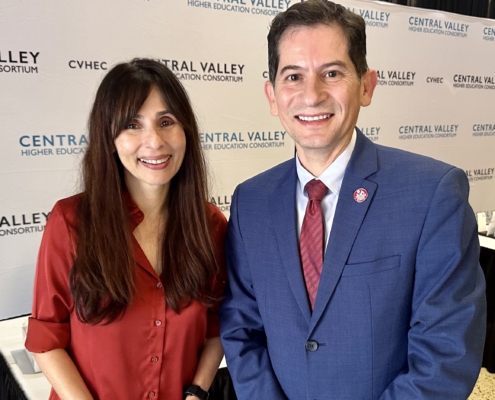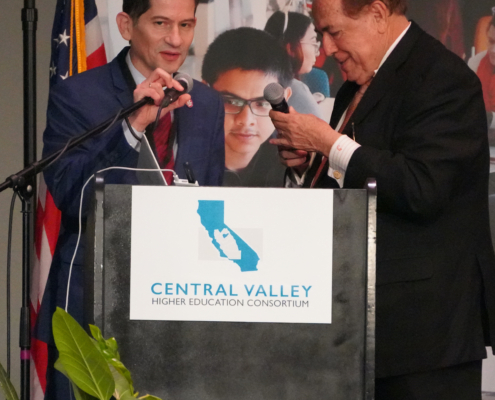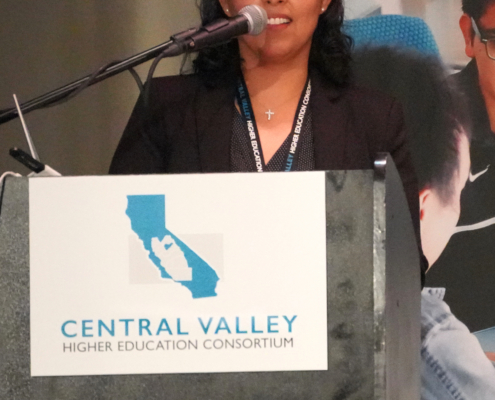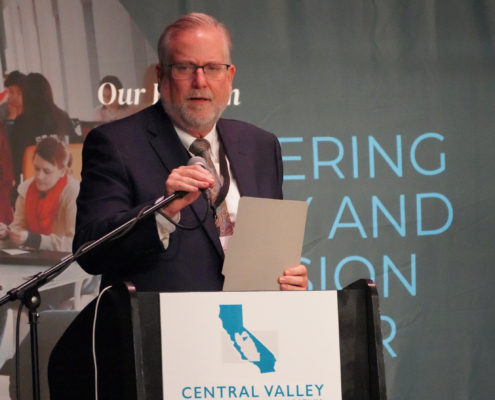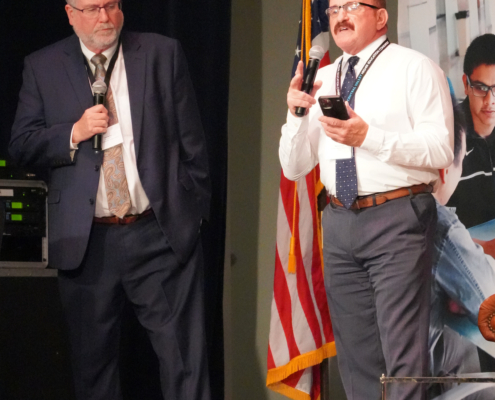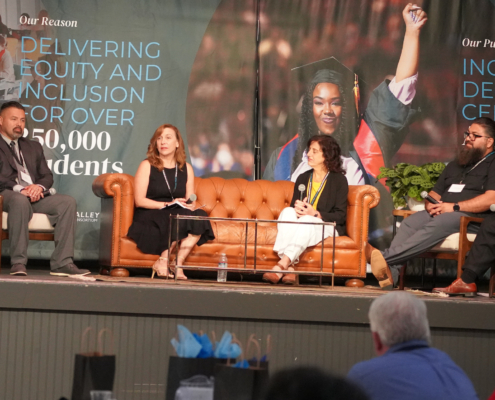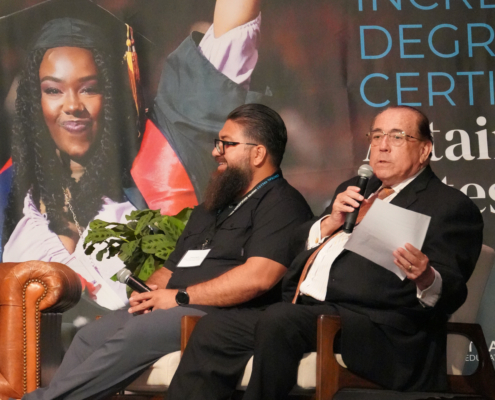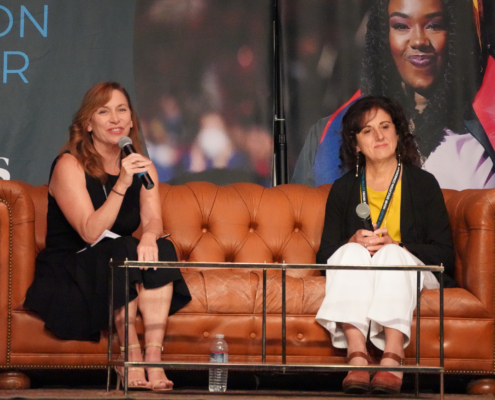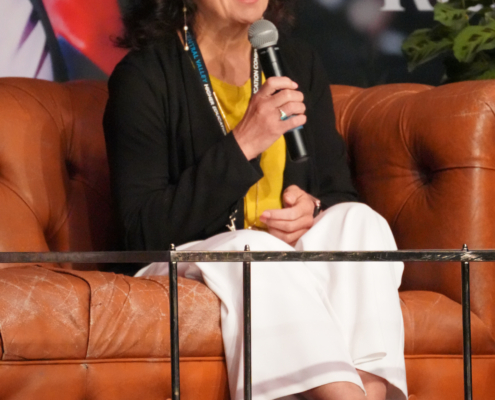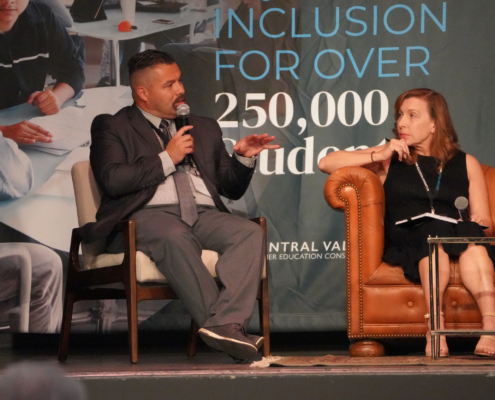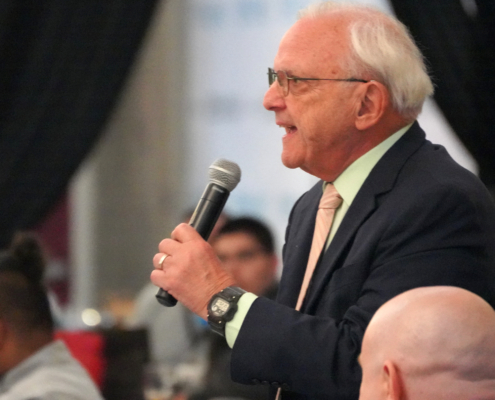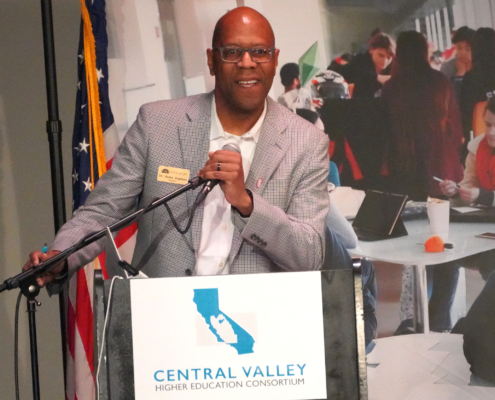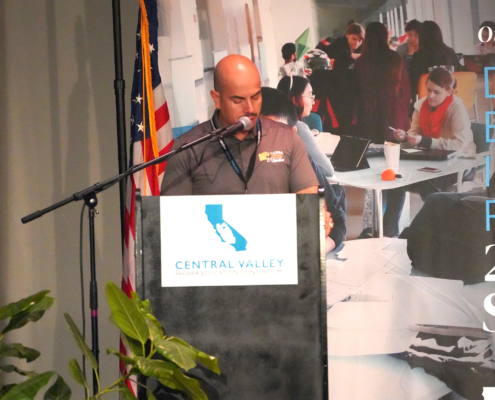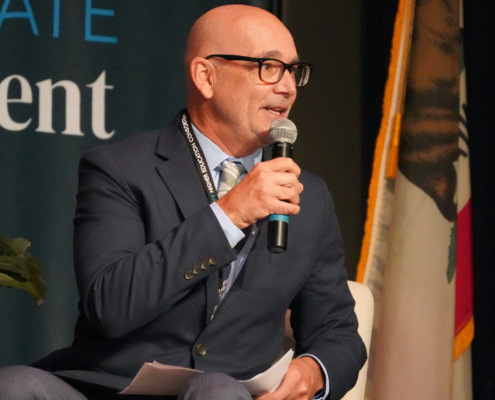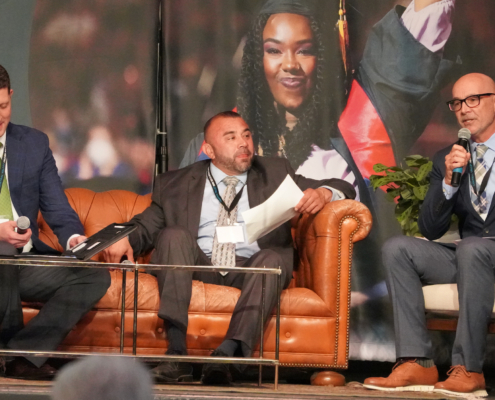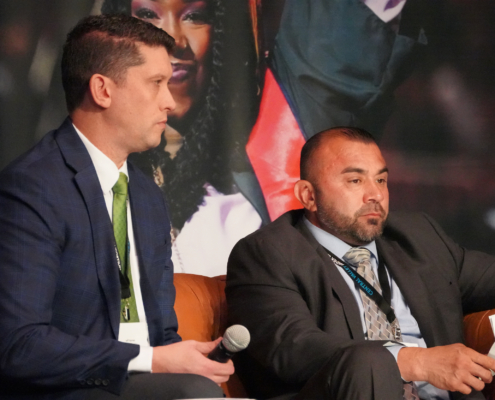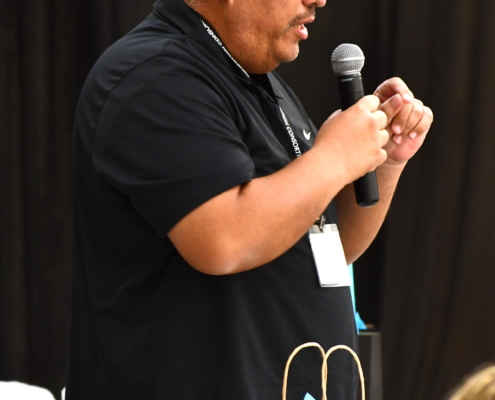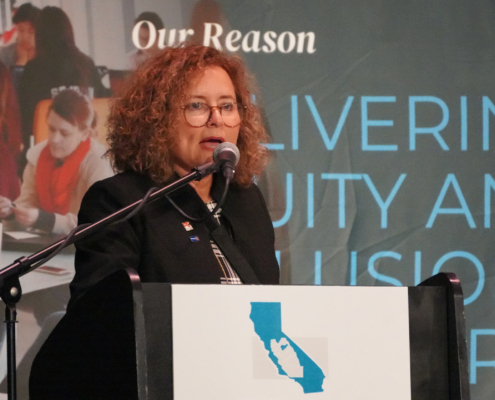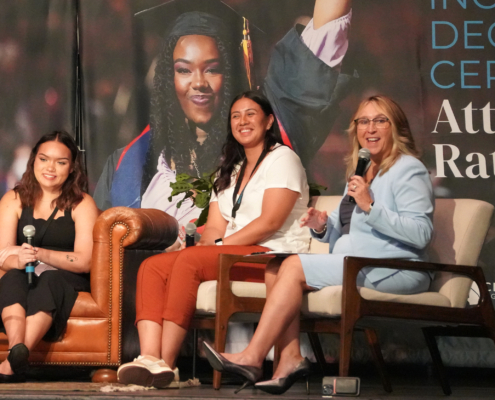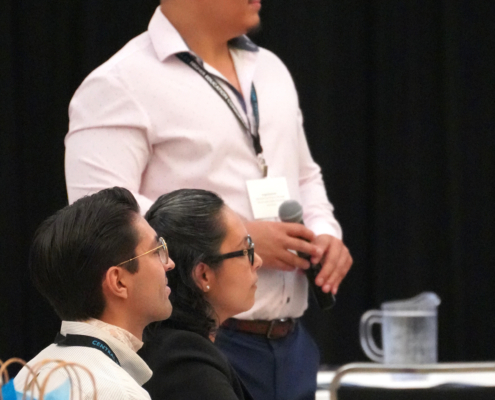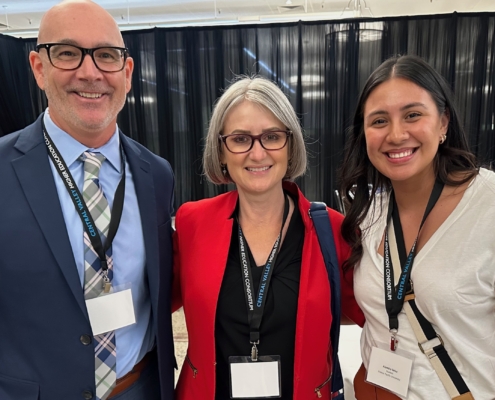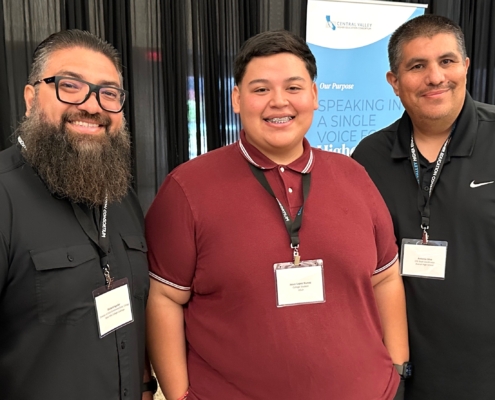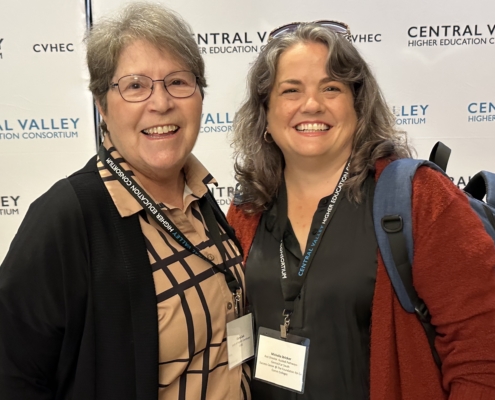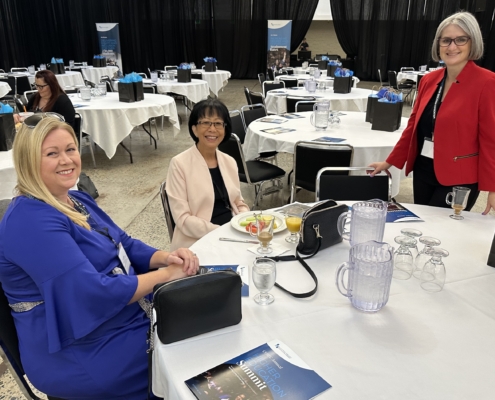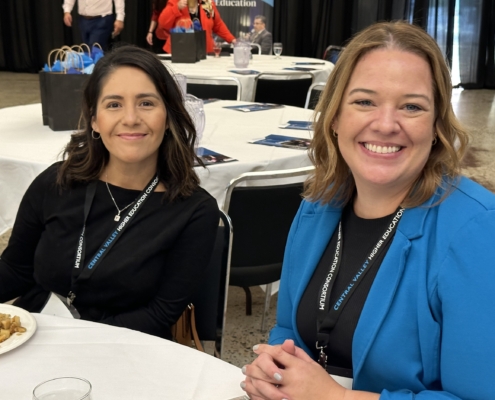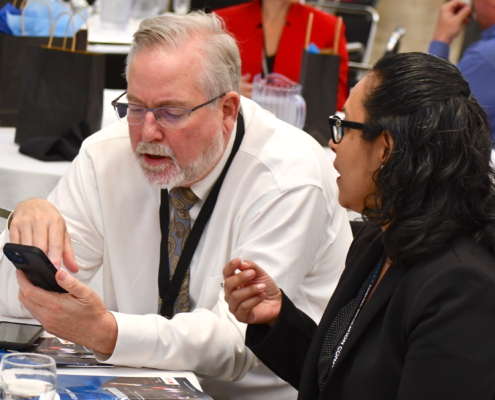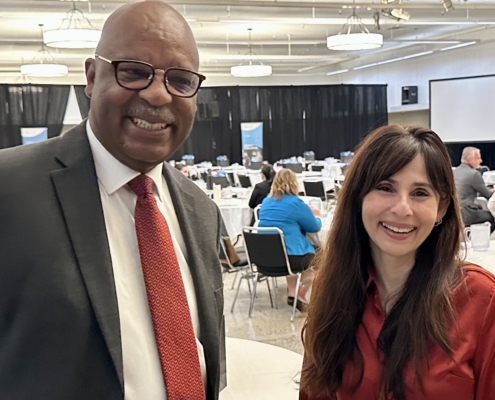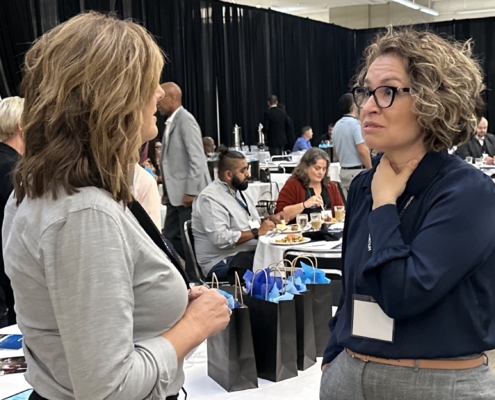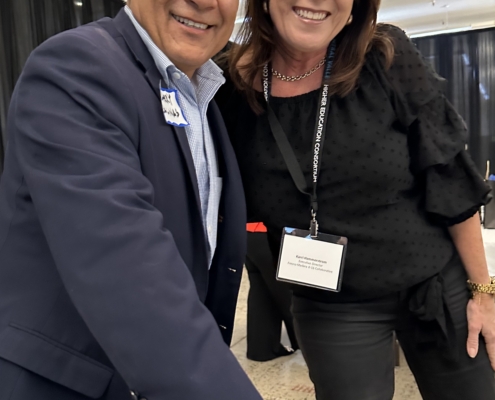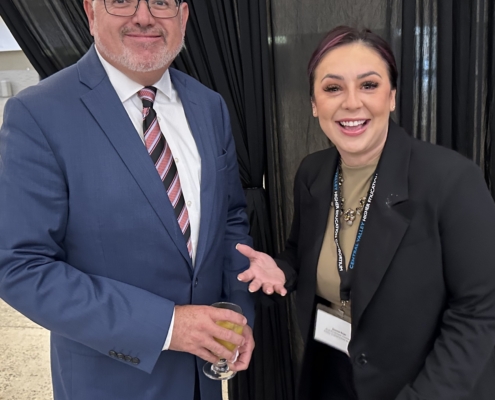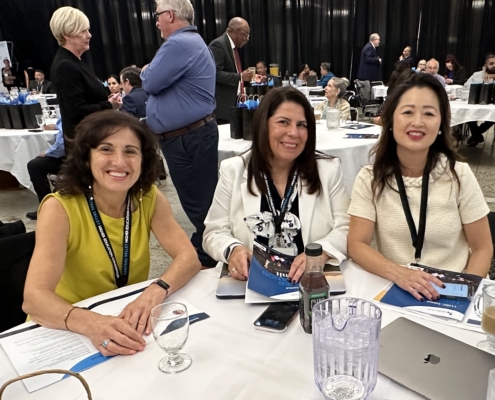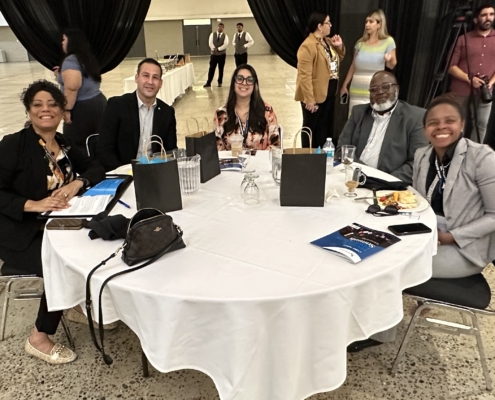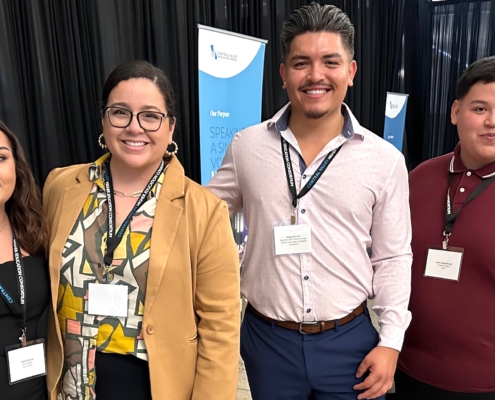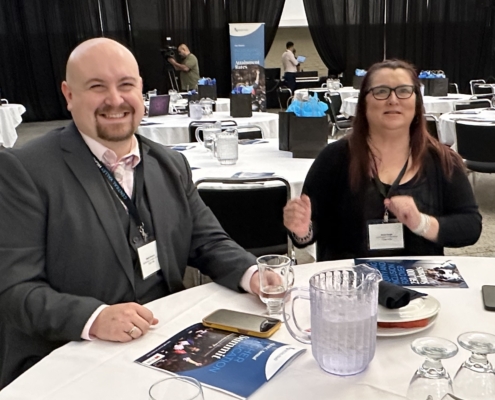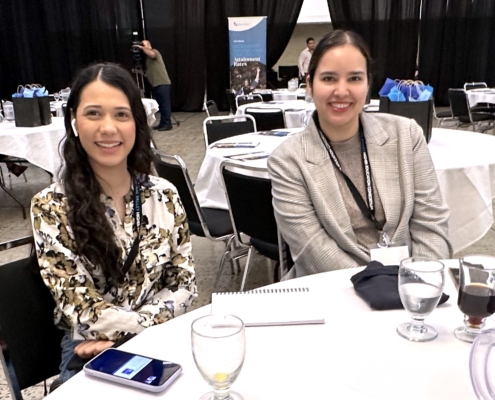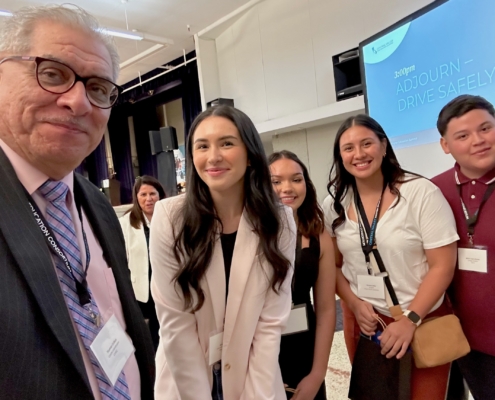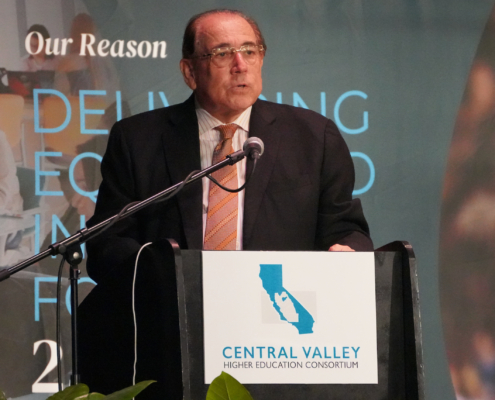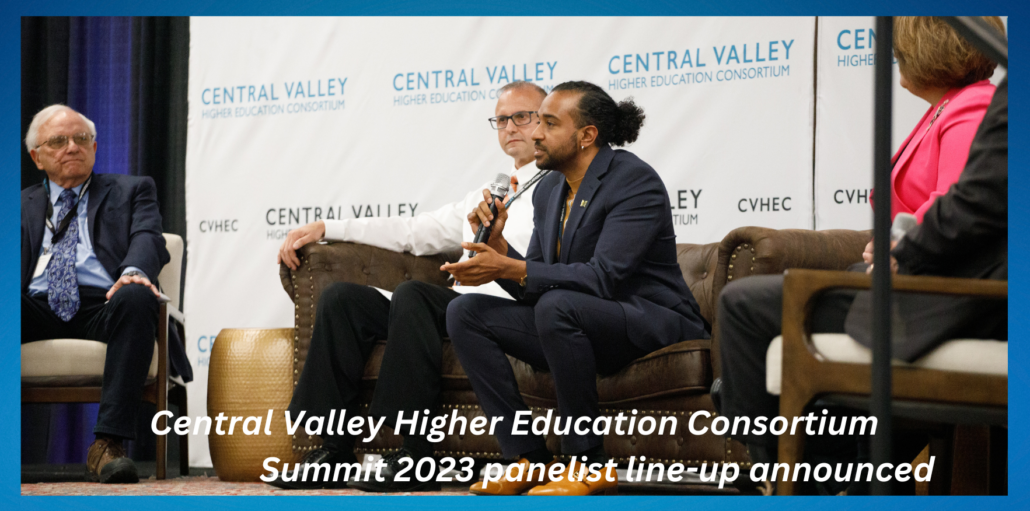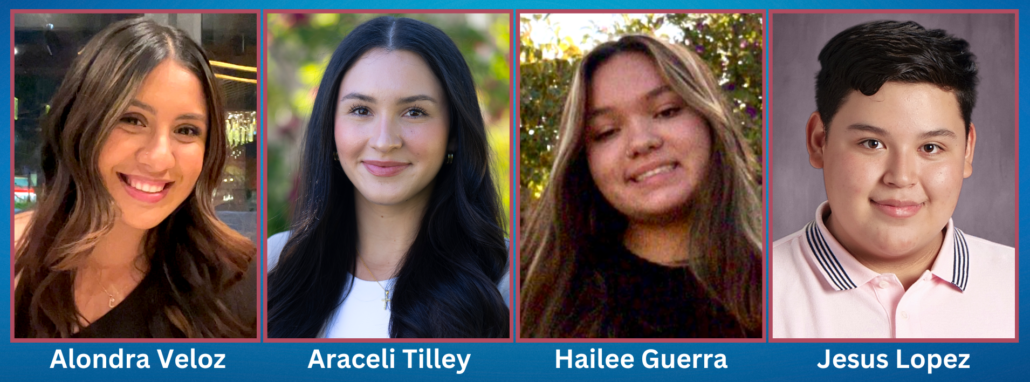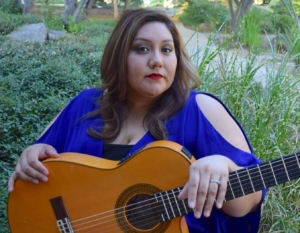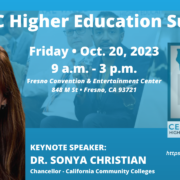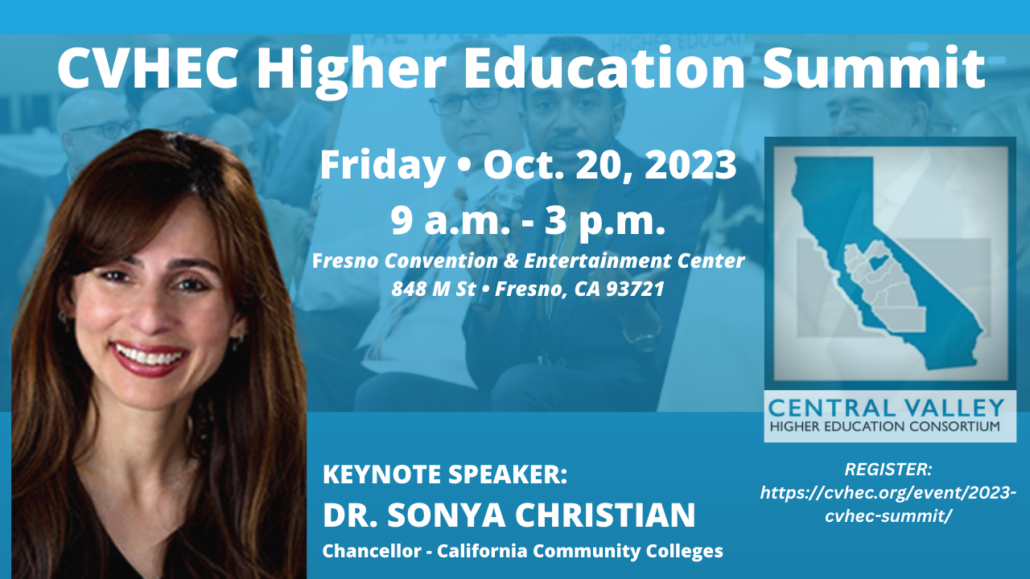WHAT THE CV-HEC IS HAPPENING BLOG (Summer 2024): Why some colleges are worth it
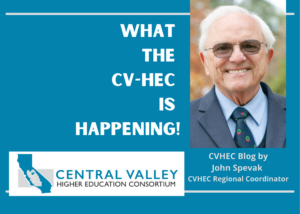 In the “What the CV-HEC is Happening” Blog for our summer 2024 special edition, Dr. John Spevak presents an observation about the value of a higher education. Dr. Spevak, who is a vice president-emeritus of Merced College and currently a regional coordinator for CVHEC, coordinates the English and Math Task Forces for the consortium — all champions for student support through such measures as dual enrollment. Through the consortium task forces, the former English teacher and college administrator continues to work closely with educators in the field for the educational advancement of students.
In the “What the CV-HEC is Happening” Blog for our summer 2024 special edition, Dr. John Spevak presents an observation about the value of a higher education. Dr. Spevak, who is a vice president-emeritus of Merced College and currently a regional coordinator for CVHEC, coordinates the English and Math Task Forces for the consortium — all champions for student support through such measures as dual enrollment. Through the consortium task forces, the former English teacher and college administrator continues to work closely with educators in the field for the educational advancement of students.
Higher ed is still a good
investment … and attainable
BY DR. JOHN SPEVAK
CVHEC Regional Coordinator
Vice President-Emeritus – Merced College
According to the results of a recent poll by Gallup and the Lumina Foundation, Americans are losing faith in the value of a college education.
Overall, according to that poll as reported by the Associated Press, only 36 percent of adults say they have a “great deal” or “quite a lot” of confidence in higher education. What’s worse, the poll shows that 32 percent of Americans have little or no confidence in a college education.
That’s both misleading and misguided.
For one thing “college” can mean different things to different people. For another, having a degree from the right college can make a big difference in a person’s opportunity and income.
By “right college,” I don’t mean a prestigious private college. A right college often means, especially in California, a two-year community college, a state university, or a small private college which provides significant financial aid.
A two-year community college degree or a certificate of completion is indeed “college.” That degree or certificate can be very valuable, especially if it’s a career-technical program that’s in demand and pays well, like nursing or welding.
A four-year degree can be even more valuable, especially in fields like communications, business, health, information technology and engineering– to name a few. Their lifetime earnings are significantly higher than those with a degree.
As the Associated Press article pointed out, “For those who forgo college, it often means lower lifetime earnings, 75 percent less compared with those who get bachelor’s degrees, according to Georgetown University’s Center on Education and the Workforce. And during an economic downturn, those without degrees are more likely to lose jobs.”
One of the reasons many Americans are doubting the worth of a college education is the debt often incurred in getting one. As one person interviewed in the AP article put it, “You graduate out of college, you’re up to eyeballs in debt, you can’t get a job, then you can’t pay it off.
What’s the point?”
It’s true that many people over the past decades have incurred a significant debt from student loans, which is exacerbated by the exorbitant interest charged for these loans. I know several people who have long ago paid off the principal of their student loans but are still paying and paying the interest.
However — and this had to be noted, known and understood — a person today can get a college degree without going into significant debt. The cost, for example, of attending a California community college these days in terms of tuition (also known as enrollment fees) is often zero.
Many California community colleges are also working at reducing the cost of books by providing what’s called “open educational resources,” essentially free online textbooks, often created by the college’s faculty members.
Attending a California public university or small private college can also be financially available to most Californians, especially if they begin with a two-year associates transfer degree and then follow a plan of courses that get them to the bachelor’s degree in no more than two additional years.
I’m tired of so many Americans of all backgrounds thinking of “college” as only prestigious private institutions that charge $150,000 or much more for a four-year tuition. Those universities often have value for those who can afford it or who receive full scholarships. But the vast majority of people can’t afford that amount and can’t afford to take out loans to pay for it.
“College” for most people should not be an expensive private institution. If it were, I would also wonder if a college education was worth it. However, “college,” in California and especially in the Central Valley, is accessible, affordable and worth it.
Instead of young people (and their parents) asking, “Can I afford college,” I wish they would ask, “What are my college options? What are the real costs, not just according to pundits on TV or social media, but according to the colleges themselves.”
College personnel, more than ever, are ready and willing to talk with prospective students of all ages and the parents of younger students about the real cost of a college education. And they are also ready and willing to show prospective students the extensive personal help they will receive to succeed in courses and earn their degree.
Often television and social media pundits who say college is not worth it are people who themselves have benefited from a college education. There’s some hypocrisy in that.
It’s true that there are many hard-working Americans without a college degree who can support themselves and their families, but the odds of most people doing this are long.
In California’s Central Valley, where the median family income is below the national average, it’s especially important to dispel the myth that college is not worth it. A two-year or four-year college degree is one of the best ways to achieve an income that will sustain families — enable them to pay rent or a mortgage, purchase a reliable car, buy clothes and put food on the table.
Central Valley colleges from Stockton to Bakersfield are working harder than ever to show students the value of a college education and to streamline the paths to a degree.
Community colleges in the valley, for example, are offering more dual enrollment courses than ever where students can earn college credits in high school, which reduces their time to a college degree.
These dual enrollment courses can be taken by most high school students, not just those students who in the past were steered into advanced placement (AP) courses. Community colleges are also working harder than ever, in collaboration with their high school partners, to provide the academic support needed to successfully complete dual enrollment courses.
In addition, many Central Valley community colleges, including Merced College, are partnering with the University of California Merced and local California State University campuses to provide user-friendly guides or “maps” to students and their parents. “Pathways Program Mapper” is a tool these colleges have developed that is available to anyone with a cell phone (no login or password required).
PPM will show a student what degree is needed to enter a particular career (for example, biology, business, engineering, etc.), what range of salaries people in those careers earn and then provide a map of courses from the first semester at a community college to the last semester at a university to attain that degree in the shortest possible time.
So, please, pundits, stop telling people that a college education isn’t worth it. Moreover, I hope readers of this column spread the word that here in the Central Valley a college education is not only worth it, but it’s attainable for anyone willing to pursue it.
John Spevak’s email is john.spevak@gmail.com.
CVHEC $1.5m funding renewal: higher ed strategies for ‘economic, social and educational well-being of valley students’
In a 21-year quest to improve the postsecondary success of students in its region, the Central Valley Higher Education Consortium has once again gained College Futures Foundation (CFF) refunding with a $1.5 million grant to continue championing dual enrollment, math pathways, Open Education Resources/Zero Textbook Costs measures and transfer student support as well as strengthening data access for improved strategy planning.
Dr. Benjamín Durán, CVHEC executive director, announced the new three-year grant (Jan. 2024 – Dec. 2026) from its primary funder this week saying it will allow the consortium — made up of 28 institutions of higher education throughout the Central Valley’s nine-county region that represents one-third of the state of California — “to implement equity-driven strategies that decrease disparities in student persistence and higher education attainment and provide students a timely pathway to completion.
“We appreciate the College Futures Foundation’s continued support for CVHEC activities that are designed to impact student success most efficiently at our member institution,” said Durán, who is president-emeritus of Merced College.
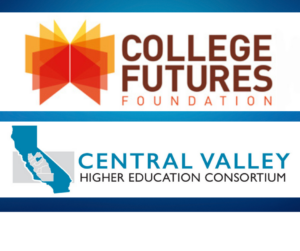 Established in 2005, College Futures Foundation uses a wide variety of human and financial resources and tools — including nearly $20 million in grants annually — towards its mission: increase postsecondary completion for learners who are underserved centering learners and their aspirations and needs on the path to achieving their educational goals.
Established in 2005, College Futures Foundation uses a wide variety of human and financial resources and tools — including nearly $20 million in grants annually — towards its mission: increase postsecondary completion for learners who are underserved centering learners and their aspirations and needs on the path to achieving their educational goals.
“We collaborate with organizations and leaders across California’s postsecondary ecosystem and beyond that share a vision of equity and upward mobility for Californians,” its website states
The partnership between CVHEC and College Futures began in 2016 when the consortium was awarded its first CFF grant.
The long-term vision for the consortium’s CFF proposal is that “initiatives and projects shepherded by CVHEC will result in policies, programs and best practices that will be institutionalized in Central Valley institutions of higher education and will lead to improving the economic, social and educational well-being of the students in the valley.”
Durán added that the funding shows CFF recognizes how CVHEC has intentionally engaged in establishing a cohort of colleges and universities working collaboratively to implement strategies and practices that can help transform the higher education attendance and degree/certificate attainment rates in the region thus creating meaningful pathways for Central Valley students.
With a membership of 28 accredited public and private colleges, universities and community colleges from San Joaquin County in the north to Kern County in the south, CVHEC’s Board of Directors is composed of chancellors, presidents and campus leaders of those member higher ed institutions. As the CVHEC Board of Directors, they speak with a single voice for advocacy, policy and legislation for higher education in the Central Valley region, Durán said.
The CFF grant reflects a commitment to the goals and priorities of the consortium through these five equity-driven strategies designed to decrease disparities in student persistence and higher education attainment for timely pathway to completion:
- Dual Enrollment — expand the dual enrollment course offerings in the Central Valley to enhance opportunities for underrepresented students in rural and underperforming urban high schools and decrease time to degree or certificate attainment.
- Transfer Student Support — increase the number of students transferring with an Associate Degree for Transfer (ADT) to all Central Valley CSU and UC campuses, as well as its non-profit independent institutions members (Fresno Pacific, National University, and University of the Pacific).
- Open Educational Resources — collaborate with the Statewide Real Colleges Task Force and West Hills College Lemoore President James Preston, a member of the SRC Task Force, to form a Central Valley Open Educational Resources Task Force and establish successful models of OER courses at member colleges.
- Data Development – expand the Central Valley Higher Education Student Dashboard to include essential student metrics at all member colleges and universities.
- Mathematics Pathways – collaborate with the Charles A. Dana Center, College Bridge) and Valley colleges and universities to support the scaling of mathematics pathways from high school through postsecondary education and into the workplace, aligned to students’ goals and aspirations.
Other CVHEC projects and accomplishments include serving an integral role in the development of four state-funded K-16 Collaboratives within the nine-county region supporting regional efforts to develop and streamline equitable pathways from high school to post-secondary education and into the work force. CVHEC has initiated the K-16 Collaborative Master’s Degree Upskilling English and mathematics initiative to prepare high school teachers to teach college dual enrollment courses at their high schools, resulting in 100 high school math teachers and 100 English high school teachers earning their Master’s degrees that allows them to meet minimum qualifications to teach college courses at the high school.
CFF funding also supports major CVHEC activities such as its annual Central Valley Higher Education Consortium Summit as well as hosting or participating in other conferences and regional convenings.
BACKGROUND: Founded in 2002, the Central Valley Higher Education Consortium (CVHEC), strives to implement strategies and practices that can help to transform the higher education attendance and degree/certificate attainment rates in the region to create meaningful pathways for students in the region by successfully establishing and engaging a cohort of colleges and universities that work collaboratively towards that end. CVHEC is a 28-member strong consortium of accredited public and private colleges, universities, and community colleges members in a nine-county region of California from San Joaquin County in the north to Kern County in the south. Member chancellors, presidents and campus leaders serve on the CVHEC Board of Directors speaking with a single voice for advocacy, policy and legislation for higher education in the Central Valley region. These institutions of higher education serve 4.3 million people living in California’s Central Valley, a 27,500 square mile region the size of South Carolina that is rural in general, with an extensive array of farms, ranches, small towns and growing cities – including Fresno, the fifth largest city in California. The Central Valley is historically distinctive as one of the most ethnically diverse regions in the United States with challenging socio-economic and college going rates.
MEDIA INQUIRIES: Tom Uribes, CVHEC Communications/Media coordinator – 559.348.3278 (text) or cvheccommunications@mail.fresnostate.edu
CVHEC’s Year-In-Review 2023
Many strands coming together into one fabric
— a glimpse at the past 12 months
By CVHEC TEAM
(Tom Uribes, Dr. John Spevak and Stan Carrizosa)
The Central Valley Higher Education Consortium completes our 21st year with this 2023 Year-In-Review as seen through the headlines of our monthly e-newsletter, now in its 35th edition. (A special summer edition covers June-August).
While much was accomplished the past 12 months, perhaps our main achievement was a combination of many accomplishments, with the CVHEC team working simultaneously on many strands that come together into one fabric. We have remained committed to building a road to educational and career success for all students, especially those in grades 9 to 14, by continuing to focus on efforts with these major strategies throughout 2023:
- For community college transfer students, we expanded our Central Valley Transfer Project and its Program Pathways Mapper software, inspiring the California Community Colleges to adopt the program as a demonstration project for possible system-wide implementation in the future;
- For high school students, we have encouraged the ongoing growth of dual enrollment, most notably by partnering with College Bridge to help initiate and develop the Central Valley Math Bridge Program involving many of our community college members and their respective feeder high schools as well as expanding our Master’s Upskilling Program initiated two years ago into Kern County;
- We are fostering a Central Valley approach to the understanding of Assembly Bill 1705 through our English and Math Task Forces that are now in full swing with an eye to a productive 2024 and the implementation of this legislation that focuses on student success in math and English.
On a broader state and national scale, we closed the year this month with two major conferences: the Talent Hub Convening in Mobile, Alabama by the CivicLab where we revisited how partnerships between industry and education, working off the same playbook, are vital to cross-collaboration success for both landscapes; and the Complete College America conference in Las Vegas, Nevada where we explored “a clear-eyed vision for leading systems change” in higher education throughout our nation.
See this look back at the CVHEC 2023 story:
JANUARY
In January, we announced that the Dual Enrollment Math Bridge Project — a partnership between the Central Valley Higher Education Consortium, College Bridge and the Rand Corporation — was awarded a five-year $4 million federal grant in late December. The project, with a total budget of $6.7 million, involves six CVHEC community college members providing college-level math classes at 21 rural high schools that will improve and support college readiness for underprepared students in those colleges’ respective service areas beginning next fall. UPDATE: A kickoff for the participants has held in May. The participating CVHEC colleges are: Cerro Coso, Columbia, Madera, Reedley, Taft and West Hills College Coalinga.
‘First of its Kind’ CVHEC Transfer Project Gaining Statewide Interest
The CVHEC Transfer Project with the Program Pathways Mapper that began in 2019 was invited to present at several state and national events as the consortium continues to lead a concentrated effort to increase the number and success of community college transfers from the nine-county region to four-year colleges and universities. The project has grown to nine community colleges and three four-year institutions early research compiled for the project showing a direct correlation between students using the Program Mapper and important student success metrics.
CVHEC Website Feature: Professional Staff Page
CVHEC continued featuring the revamp of its website undertaken in the past year with a new section presented each month including the staff page in January. CVHEC’s 11 team members includes several who are retired from careers dedicated to serving students at their respective institutions of higher education – a service that now continues through CVHEC. All lend their energy, enthusiasm and experience to enhance student success and achievement throughout the region by collaborating with the consortium’s member institutions and the CVHEC Board of Directors.
FEBRUARY
CVHEC Board Member Dr. Christian Makes History as CCC’s First Woman, Asian-American Named Chancellor
Feb. 23, Dr. Sonya Christian, CVHEC board member who is featured in this summer issue with a vlog, made history when she was appointed as chancellor of the California Community Colleges System — the first Asian-American and the first woman to serve as chancellor for the largest and most diverse system of public higher education in the nation as well as a first-generation college graduate. Chancellor Christian began her term July 1 and for our Mach issue, she is featured in our “What the CVHEC is Happening” Blog discussing her time in the KCCD where she was president of Bakersfield College before serving as KCCD chancellor until her new assignment. In this issue, she is featured in the vlog discussing what lies ahead for the CCC.
Two veteran Kern County educators were named faculty mentor coordinators for the Central Valley Higher Education Consortium’s Kern Master’s Upskilling Project that was launched last year to help high school teachers earn master’s degrees in Math or English so they can teach dual enrollment courses on their campus: Dr. Liz Rozell (math) and Dr. Vikash Lakhani (English). UDPATE: The first cohorts of 21 math students and 25 English students in the Kern Master’s Upskill Program are underway through Fresno Pacific University and National University respectively.
CVHEC Website Feature: Dual Enrollment Page
The February issue’s website feature presented the CVHEC Dual Enrollment Page with the strategies undertaken by CVHEC’s Central Valley Dual Enrollment for Equity and Prosperity (CVDEEP) Task Force established in 2019 to identify and establish the best elements of an intentional and sustainable strategy for dual enrollment. CVDEEP is made up of more than 150 secondary and postsecondary education leaders who gather annually for dual enrollment convenings.
MARCH
The Central Valley Math Bridge Kick-off set for May 18
In March CVHEC announced that the movement to promote equity and college-readiness in mathematics via dual enrollment courses for underprepared students at rural Central Valley high schools next fall will formally launch May 18 with the Central Valley Math Bridge Kick-off in downtown Fresno presented by co-hosts College Bridge, Central Valley Higher Education Consortium and the Rand Corporation. UPDATE: 95 representatives of the first cohort of 13 Valley high schools in the new Central Valley Math Bridge Program convened with nine community college members for the May 18 kick-off where they began planning the program’s implementation. Rural high schools may still sign up for groundbreaking project that is ‘a model for meaningful dual enrollment pathways that can be replicated statewide.
Recruitment of community college mentors for HS teachers in Kern MA Upskilling Project is underway
The Kern Master’s Upskilling Project announced the recruitment of community college professors to serve as mentors for high school teachers enrolled in the project. The teachers can earn master’s degrees in math or English qualifying them to teach dual enrollment course at their high school campus.
Historic CVHEC Transfer Project/Program Mapper Featured at CSSO
The historic Central Valley Higher Education Consortium Transfer Project and its Pathways Program Mapper continues to break ground across the state for transfer reform with a presentation at another statewide convening: the 2023 Chief Student Services Officers Association (CSSO) Annual Spring Conference March 15 in Los Angeles.
APRIL
(APRIL 20, 2023) — A new state-funded math dual enrollment program will “positively impact” approximately 630 non-traditional students at seven rural high schools next fall through four area community colleges that are members of the Central Valley Higher Education Consortium. The Dual Enrollment (DE) Math Bridge – a partnership between CVHEC, College Bridge, the Fresno-Madera K-16 Collaborative, the Tulare-Kings College & Career Collaborative and CVHEC-member Fresno Pacific University – will provide equitable access to transfer-level math courses with embedded support for high school students who are disproportionately impacted and/or are not traditionally college-bound.
CVHEC leads California delegation at CCA Day on the Hill
(APRIL 20, 2023) — Dr. Benjamin Duran, executive director of the Central Valley Higher Education Consortium, joined Complete College America for its CCA Day on the Hill in Washington, D.C. May 16- 17 where “a network of higher education experts shared strategies and lessons for the implementation of higher ed strategies at scale.” Complete College America is a national non-profit alliance of state and higher education leaders. He met with Valley Congressmember Jim Costa.
CVHEC Summit re-scheduled for October 2023
The Central Valley Higher Education Consortium Higher Education Summit 2023, originally set for May, has been rescheduled for Oct. 20, 2023. The CVHEC Board of Directors will meet the day before the summit (Thursday, Oct. 19).
Recruitment for the second cohort of Kern high school math teachers to enroll in the Kern Dual Enrollment Teacher Upskilling Pathway for English and Mathematics that qualifies them to teach dual enrollment courses began in April with classes set to begin this August.
Dr. Sonya Christian, California Community College system chancellor, was the guest speaker for the Central Mother Lode Regional Consortium’s “Enrollment Growth & Pathways: A Strategy Session” April 25 hosted by Fresno City College President Robert Pimentel. CVHEC’s Angel Ramirez, operations and finance manager, and Elaine Cash, grants and programs coordinator, presented on the regional dual enrollment efforts taking place across the Central Valley.
MAY
The Central Valley Higher Education Consortium’s new Zero Textbook Costs/Open Educational Resources Task Force will form in the coming months, West Hills College Lemoore President James Preston reported to the CVHEC Board of Directors at its quarterly meeting May 11 in Fresno. The action highlighted a full agenda of information for the board made up of the chancellors, presidents and campus directors of 28 institutions of higher education in the Central Valley’s nine-county region. The next CVHEC board meeting is set for Oct. 19.
Representatives of the first cohort of 13 Valley high schools in the new Central Valley Math Bridge Program convened with nine community college members of the Central Valley Higher Education Consortium May 18 in Fresno to formally launch the program and plan for its implementation. Presented by co-hosts College Bridge, Central Valley Higher Education Consortium and the Rand Corporation, the event drew 95 participants to kickoff the project that promotes equity and college-readiness in mathematics via dual enrollment courses for underprepared students at rural high schools in the region next fall. Dr. Lynn Cevallos, founder and president of College Bridge, warned in her keynote, “The State of Mathematics in California,” that the dire reality of academic disjuncture which has culminated in a pending crisis could see “the doors to STEM careers closing for our students. Fortunately, the Math Bridge project is designed to keep those pathways open,” she said.
The Central Valley Higher Education Consortium was featured nationally on Radio Bilingue April 13 as a co-sponsor of one of 20 Broadband for All Digital Equity and Broadband Equity, Adoption, and Deployment (BEAD) Planning Regional-Local Workshops being held throughout the state by the California Department of Technology. CVHEC Executive Director Benjamín Durán served as a spokesperson at the Merced event held April 14 and was interviewed the day prior for the Spanish-language show Linea Abierta on Radio Bilingüe, the nation’s only daily Spanish-language talk show in public radio.
Merced College milestones: 60th Commencement and first in Los Baños
Merced College observed the 60th anniversary of its Commencement Ceremony held May 26 by presenting a full commencement ceremony at its Los Baños campus May 25 for this first time. The Los Baños ceremony was the latest in a series of investments and initiatives to grow the campus and give Westside students a complete educational experience close to home.
SUMMER EDITION
(Published July 19, 2023)
Supreme Court ruling is not the death of Affirmative Action but rather a challenge
Statement by Dr. Benjamín Durán, CVHEC executive director, on the June 29 United States Supreme Court Affirmative Action ruling: ‘in one week — after decades of progress — equity, diversity and access in higher education were simultaneously under attack. However, I offer that this Supreme Court ruling is not the death of Affirmative Action but rather a challenge to renew and reinforce its spirit and outcomes.” See July Director’s Message.
Students at Modesto Junior College and Columbia College will have increased access to University of California, Merced thanks to an agreement signed July 11 between the university and Yosemite Community College District: the Merced Promise Pathway Memorandum of Understanding (MOU) between the three Central Valley Higher Education Consortium members that provides a clear, streamlined pathway to UC Merced for MJC and Columbia students as well as a variety of supports to help them prepare for life at a four-year university. See Merced Promise Pathway story.
SOFT START program awarded $2.4M for two CVHEC members in ‘Internet for All’ funding
A collaboration that prepares at-risk students and low-income residents for careers in IT-cybersecurity is set to launch this fall by Central Valley Higher Education Consortium members Fresno State and Fresno City College in partnership with the Fresno County Public Library as part of a two-year, $2.4 million federal grant by the National Telecommunications and Information Administration’s Connecting Minority Communities Pilot Program announced in February. Fresno State was one of five minority-serving institutions to receive a portion of over $18.5 million in “Internet for All” funding meant to expand community technology hubs, upgrade classroom technology and increase digital literacy skills as California faces a shortage of about 73,000 cybersecurity professionals. See CVHEC story and KSEE-24 NBC “Education Matters” report.
UPDATE: Registration is available for two new Fresno State SOFT START Cybersecurity cohorts that begin Jan. 31, 2024: the Beginning Certificate session and the first Intermediate Certificate session. FCC certificate programs will be rolled out in fall 2024.
WHAT THE CV-HEC IS HAPPENING BLOG Pt. 2: CCC Chancellor Sonya Christian
For this summer edition of our “What the CV-HEC is Happening” blog, we feature part two of California Community Colleges Chancellor Sonya Christian, Ph.D, with this podcast interview.
See CVHEC CCC Chancellor Blog.
SEPTEMBER
(Published Sept. 7, 2023)
CVHEC Summit Oct. 19-20 features keynote
Dr. Sonya Christian, chancellor of the California Community Colleges, will return “home” Oct. 20 when she delivers the keynote for the Central Valley Higher Education Consortium Summit 2023 in Fresno. With the theme “Student Success through Equity and Inclusion — Thriving in the Central Valley,” the summit will be held from 9 a.m. to 3 p.m. Friday, Oct. 20, at the Fresno Convention Center’s Ernest E. Valdez Exhibit Hall. See summit keynote story.
Open Educational Resources movement launched with $580,180 K-16 grant to CVHEC members
The pioneering Open Educational Resources Improvement Project – a collaboration of Central Valley Higher Education Consortium members and partners – kicks off with a $580,180 state grant as well as a new CVHEC OER Task Force and convening planned for later this fall. CVHEC-member West Hills Community College District recently announced the Fresno-Madera K-16 Collaborative Mini-Grant Award for the groundbreaking initiative that is poised to usher in a new era of educational opportunities by revolutionizing learning, teaching and research materials across the Central Valley. The project is in collaboration with the State Center Community College District and its campuses — Fresno City College, Madera Community College and Reedley College (all consortium members) — and CVHEC. See OER story.
UPDATE: plans for the OER convening and task force announcement will be forthcoming in early 2024.
CVHEC 2022 Mini Grant funds FPU Tri-Alpha Honor Society for first-generation students
A Central Valley Higher Education Consortium Mini-Grant awarded to member Fresno Pacific University earlier this year helped establish a local chapter of the Alpha Alpha Alpha Honor Society (Tri-Alpha) that recognizes and engages first-generation college students. The $6,477 CVHEC grant created undergraduate research fellowships that allows the university to provide research stipends for students and faculty as well as covered student membership fees; two induction ceremonies; and speaker honoria and refreshments for monthly chapter meetings. The CVHEC Mini-Grants, funded by the College Futures Foundation, are awarded to member institutions in support of the consortium’s mission to increase degree attainment rates. See FPU Mini-grant story.
CVHEC website feature: English and Math Task Forces
The Central Valley Higher Education Consortium launches two new web pages this month featuring its two intersegmental task forces consisting of math and English educators representing the 15 community college members in the region that are part of the 28-member consortium. First formed in 2019 under the leadership of Dr. John Spevak, a CVHEC coordinator and a former Merced College vice president, the mission of the English and Math Task Forces is to streamline math and English pathways for students by examining topics and issues of those disciplines and recent legislation as part of CVHEC’s mission: improve certificate and degree completion rates in the nine-county region from San Joaquin to Kern. See the English Task Force and Math Task Force stories.
The Tachi Yokut Tribe donated $3 million to the West Hills Community College Foundation for a comprehensive Native American studies program at West Hills College Lemoore. See Tachi donates story.
UCSF Fresno celebrates new doctors for Central Valley/state
It takes 11 years or more to produce a practicing physician after high school, depending on the specialty. On June 15, UCSF Fresno celebrated the completion of years of training for more than 100 graduates. See UCSF Fresno new doctors story.
WHAT THE CV-HEC IS HAPPENING BLOG (September 2023): Teachers
As students return to classrooms for the fall semester, this month’s “What the CV-HEC is Happening” Blog is a message about the lifelong impact that teachers deliver for their students by Dr. John Spevak, a former teacher who is a vice president-emeritus of Merced College and currently a regional coordinator for CVHEC. See Teachers Blog.
OCTOBER
(Published Oct. 10, 2023)
Summit of college leaders takes on valley’s higher ed issues
Several community college chancellors and presidents lead the charge Oct. 20 when the heads of 28 valley colleges and other educators and policy makers convene for the Central Valley Higher Education Consortium Summit 2023 in Fresno that includes a student panel discussing their higher education experiences and a federal education legislative update by U.S. Congressman Jim Costa. CVHEC released its line-up of panelists for the summit which features a keynote address by Dr. Sonya Christian, California Community Colleges chancellor with the theme “Student Success through Equity and Inclusion — Thriving in the Central Valley,” at the Fresno Convention Center’s Ernest E. Valdez Exhibit Hall. See the CVHEC Summit panelists story.
UPDATE: At the Central Valley Higher Education Summit, Chancellor Christian announced an historic new initiative, the Central Valley Transfer Pathways Demonstration Project, in a partnership with and modeled after CVHEC’s Transfer Project.
CVHEC Math Task Force meets in-person Oct. 13 for AB 1705 follow-up
With two convenings this month, the Central Valley Higher Education Consortium Math Task Force is tackling questions regarding California Assembly Bill 1705 requiring that California’s community colleges expand their efforts to enroll and support students in transfer-level math courses in the face of implementation deadlines looming in 2024. In partnership with the California Community College Chancellor’s Office and the Charles A. Dana Center at the University of Texas at Austin, CVHEC presents a virtual sessions Oct. 6 to addressing areas of confusion regarding the bill and its implementation and an in-person session, “AB1705 Student Success Workshop,” Oct. 13 to explore how to best support students within the framework of AB1705 — a follow up to AB 705, previous legislation that fundamentally reshaped placement and remediation at the community colleges. See MTF AB1705 story.
Historic Transfer Project spurs statewide movement to increase transfer rates
As we enter the third phase of the Central Valley Transfer Project, we are pleased to report great progress has been made ranging from its infancy two years ago to nationwide interest — including possible expansion into another region of California in the near future — as our team is invited regularly to present at state and national conferences as well as at the Central Valley Higher Education Consortium’s 2023 Summit Oct. 20. Originally born out of dissatisfaction with Central Valley community college transfer rates to University of California, Merced, this effort has spurred a statewide movement at multiple levels to increase the number of successful community college transfers to four-year institutions with the Program Pathway Mapper software and laid the groundwork for the California Community Colleges’ Central Valley Transfer Pathways Demonstration Project announced at the summit. See Transfer Project update story.
WHAT THE CV-HEC IS HAPPENING BLOG: Master’s Upskill Program Success Story
Sanger West High School teacher JADE MARTÍNEZ recounts road to a post-bac degree and her first dual enrollment class. See Master’s Upskill blog.
Reedley and Merced Colleges host Math Bridge orientation for feeder high schools
Central Valley Higher Education Consortium members Merced and Reedley community colleges hosted high school math educators and administrators from their respective service area schools Sept. 21 for an orientation about the Central Valley Math Bridge Program that is now in full swing. See Math Bridge story.
NOVEMBER
(Published Nov. 6, 2023)
CVHEC Summit leaves myriad of takeaways for participants
For Araceli Tilley, an alumna of Merced College, the Program Pathway Mapper used by the Central Valley Higher Education Consortium Transfer Project proved to be not only useful for her transfer to UC Merced in fall 2022, it provided her an easy way to map her college courses for her final two years of college at UC Merced that is leading up to graduation in May 2024 with a degree in psychology. Araceli shared her experiences on the student panel at the Central Valley Higher Education Consortium Summit 2023 held in Fresno Oct. 20 where the breadth and depth of CVHEC activities such as the Transfer Project were showcased. Joined by four other students who shared their experiences in activities CVHEC has sponsored and how much their success could be attributed to those initiatives, Araceli’s remarks at the summit “earned” her a trip with the CVHEC team to share her transfer experiences statewide. Presented by CVHEC and sponsored by the College Futures Foundation, the summit attracted 184 higher education officials and educators, legislators and partner representatives for a full day of discourse surrounding Dual Enrollment, Transfers, Math Pathways and Open Educational Resources with several panels introduced and moderated by CVHEC board members. See CVHEC Summit 2023 story and photo gallery.
CCC Chancellor announces Transfer Pathways Demonstration at CVHEC Summit
The California Community College Chancellor’s Office will launch a new initiative, the Central Valley Transfer Pathways Demonstration Project, Chancellor Sonya Christian announced at the 2023 Central Valley Higher Education Summit in Fresno Oct. 20. In a partnership with the Central Valley Higher Education Consortium, the CV Transfer Pathways — modeled after CVHEC’s Transfer Project — entails developing and publishing 2 + 2 transfer pathways using the Program Pathways Mapper software to clarify the path to four-year colleges for transfer students as well as for campus staff in creating clear paths for transfer students to reach their educational goals while closing equity gaps. See the CCC Chancellor Transfer Announcement story.
Math Task Force begins discussion of AB1705 implementation – Nov. 17 next
With an eye towards ensuring the success rates of their students enrolled in corequisites to gateway math courses, community college members of the Central Valley Higher Education Consortium Math Task Force kicked off a series of convenings in October to begin preparing for implementation of Assembly Bill 1705 in the 2024-25 academic year. CVHEC announced that follow up meetings are set for Nov. 17 and Jan. 26 to continue a year-long discussion of ideas and options with the task force members and other educators in an ongoing quest for equitable mathematics under AB705 and AB1705. See Math Task Force AB1705 covenings summary story.
WHAT THE CV-HEC IS HAPPENING BLOG: Expanding the Reach of the Central Valley Math Bridge
College Bridge Vice President Owynn Lancaster updates the Math Bridge project and, after successful College Orientation meetings in September, the College Bridge team has been darting up and down the San Joaquin Valley meeting with interested feeder highs schools to onboard and launch them for the coming academic year’s CV Math Bridge Project. See Math Bridge update blog.
The San Joaquin Valley Broadband Summit Nov. 9 seeks affordable internet across the region
The San Joaquin Valley Affordable Broadband Summit Nov. 9 will bring key community leaders together to strategize for the adoption of affordable internet across the region. The California Emerging Technology Fund (CETF) is hosting the virtual summit that includes a pre-summit Nov. 1 to address broadband barriers, resources and solutions such as the Affordable Connectivity Program (ACP). At the summit, a diverse group of experts, community leaders, and advocates will share their insights and experiences in addressing Broadband Access in the San Joaquin Valley as they seek to bridge the digital divide in the San Joaquin Valley. See Broadband Summit story.
Comcast pledges $100,000 in scholarships to 5 CVHEC CC members
Comcast California presented a $100,000 donation to five Central Valley Higher Education Consortium-member community colleges ($20k each) to support the next generation of students eager to pursue careers in Science, Technology, Engineering, Arts and Mathematics (STEAM): Fresno City College, Clovis Community College, Madera College and Reedley College all in the State Center Community College District and College of the Sequoias. See Comcast STEAM story.
Community College CEOs first caucus: area state legislators address policy issues
The newly-formed Central Valley Community College CEO Caucus held its first convening Oct. 26 with valley legislators to discuss a variety of policy issues facing community colleges. The CVCCCEO Policy Summit and Legislator Convening, which brought together Central Valley state legislators, chancellors and presidents, was hosted at Madera Community College by President Ángel Reyna and led by Merced College President Chris Vitelli, chair of the Central Valley Community College CEO Caucus, and West Hills Community College District Chancellor Kristin Clark, board chair for the Central Valley Higher Education Consortium. See CVCCCEO Caucus story.
KCCD receives ACCT 2023 Pacific Region Equity Award
The Kern Community College District was awarded the 2023 Pacific Region Equity Award from the Association of Community College Trustees (ACCT) at ACCT’s annual conference in Las Vegas, Nevada last month. ACCT is an organization representing more than 6,500 community college trustees throughout the United States. See the KCCD equity award story.
CVHEC In The News 2023: Affirmative Action OP ED
https://cvhec.org/cvhec-in-the-news-affirmative-action-oped-fresno-bee/
Following the historic Supreme Court June 29 decision that severely limited, if not effectively ended, the use of affirmative action in college admissions, Central Valley Higher Education Consortium Executive Director Benjamín Durán wrote of his reaction and that of many colleagues, family and friends in his Director’s Message for the CVHEC summer newsletter edition. Dr. Durán’s message also served as the basis for this op-ed column that was published in the Valley Voices section of The Fresno Bee Opinion page July 24.
CVHEC In The News 2023: Bee panel examining decline of Latino higher ed enrollment features CVHEC leader
Dr. Benjamín Durán, executive director, of the Central Valley Higher Education Consortium, will participate on a virtual panel presented Nov. 8 (6-7 p.m.) by The Fresno Bee’s La Abeja staff, “Central Valley Latinos and higher education completion: Is there a growing gap?” The hour-long panel, presented in three 20-minute breakouts, features state and Central Valley education leaders examining the barriers to Latino student success and opportunities available. Dr. Duran will be joined by Michele Siqueiros, president of the Campaign for College Opportunity as well as Olga Rodríguez, director of the Public Policy Institute of California Higher Education Center who recently presented at the CVHEC summit in Fresno, and Carlos Nevarez, interim provost and vice president of academic affairs at Sacramento State. Fresno State students Crystal Navarro and Joseph Aquino also will discuss their experiences. See story.
CVHEC In The News 2023: CETF helps Planada establish digital community
Together with Comcast, California Emerging Technology Fund provided a $15,000 grant for the Planada Elementary School District to replace 3 laptop carts and purchase 40 Chromebooks for their students. Dr. Benjamín Durán, executive director, of the Central Valley Higher Education Consortium and Merced College president-emeritus, returned to his hometown for the presentation. See story.
CVHEC In The News 2023: Valley college leaders unveil plan to increase university transfers
The recent Central Valley Higher Education Summit and announcement of the California Community College Central Valley Transfer Pathways Demonstration Project, by Chancellor Sonya Christian was featured by KVPR Radio and GV Wire. See story
DECEMBER
(Published Dec. 20, 2023)
“The CVHEC Way to Math Success — Implementing AB1705” – Jan. 26 convening set
WHAT THE CV-HEC IS HAPPENING BLOG (September 2023): Gift of Math
Merced College: DR. BENJAMÍN T. DURÁN BUSINESS RESOURCE CENTER
Fresno Bee panel: “Central Valley Latinos and higher education completion: Is there a growing gap?”
CVHEC takes unified Central Valley voice to national/state higher ed conferences
CVHEC DIRECTOR’S MESSAGE (November 2023)
Chancellor Christian reflects her
commitment to California students
Greetings Colleagues and Friends of CVHEC,
Greetings and welcome to this beautiful fall weather as we prepare for the upcoming holiday season and the end of the fall semester.
We are delighted to report that we are coming off a very successful Central Valley Higher Education Consortium Summit 2023 held at the Fresno convention Center Oct. 20 when we were joined by over 150 of our friends and colleagues to showcase the work of consortium member colleges and universities over the last year.
The highlight of the summit was welcoming our new California Community Colleges Chancellor, Dr. Sonya Christian, home to the Central Valley to serve as our keynote speaker.
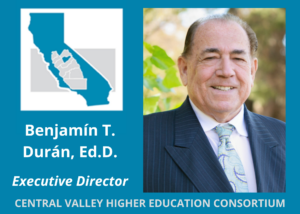 As expected, her presentation was inspiring and reflected her commitment to students in the state. Dr. Christian took this opportunity at the summit to announce and launch the CCCCO Central Valley Transfer Pathways Demonstration Project that will build upon the progress of our own Transfer Project partnership between the community colleges, the CSUs and UC Merced here in the valley. The CCCCO project is unique in California in that it includes the three segments of public colleges and universities and will eventually include the independent universities as well.
As expected, her presentation was inspiring and reflected her commitment to students in the state. Dr. Christian took this opportunity at the summit to announce and launch the CCCCO Central Valley Transfer Pathways Demonstration Project that will build upon the progress of our own Transfer Project partnership between the community colleges, the CSUs and UC Merced here in the valley. The CCCCO project is unique in California in that it includes the three segments of public colleges and universities and will eventually include the independent universities as well.
In this issue’s “What the CV-HEC is happening” blog, you will read an update about CVHEC’s innovative approach to delivering college dual enrollment math courses for high school students throughout the region via our Math Bridge project in partnership with CVHEC partner, College Bridge. The project, designed to get high school students through their first gateway college math course, will serve as a springboard for completing their degrees.
Also please plan on attending the virtual zoom San Joaquin Valley Affordable Internet Adoption Summit on Thursday, Nov. 9, from 8:30 a.m. to 12:30 p.m. The deadline to register is Nov. 7 at: https://bit.ly/SJVSummitRSVP. Bringing affordable broadband internet services to the most vulnerable populations in the Central Valley is an important part of the work CVHEC does in the valley.
Finally, enjoy our summit photo galleries where we share images and comments about the recent CVHEC summit as well as the board meeting and reception they day before. I am sure you will see many familiar faces.
Have a great November and a wonderful and restful Thanksgiving Holiday with family and friends!
CVHEC Summit 2023 wrap: a myriad of takeaways for participants
Porterville College President Claudia Habib (third from left) introduced CVHEC Summit student panelists Hailee Guerra, Araceli Tilley, Jesús López Nuñez, Alondra Veloz and moderator Dr. Carole Goldsmith, chancellor of the State Center Community College District.
Student panelist ‘earns’ a trip to CCLC to share
her transfer experiences statewide
BY TOM URIBES
CVHEC Communications/Media Coordinator
See CVHEC Summit Media Coverage: KVPR Radio and GV Wire. (MORE)
For Araceli Tilley, an alumna of Merced College, the Program Pathway Mapper used by the CVHEC Transfer Project proved to be not only useful for her transfer to UC Merced in fall 2022, it provided her an easy way to map her college courses for her final two years of college at UC Merced that is leading up to graduation in May 2024 with a degree in psychology.
Araceli shared her experiences on the student panel at the Central Valley Higher Education Consortium Summit 2023 held in Fresno Oct. 20 where the breadth and depth of CVHEC activities such as the Transfer Project were showcased. The summit is sponsored by College Futures Foundation.
She was joined by four other students who shared their experiences in activities CVHEC has sponsored and how much their success could be attributed to those initiatives: Hailee Guerra, Araceli Tilley, Jesús López Nuñez and Alondra Veloz.
“The mapper provided a straight path that really helped me out, especially because counseling and advising is super impacted at many colleges and you don’t always get to meet in-person with advisors so it was nice that I was able to self-direct using it,” Araceli said.
“And since I worked at Merced College as an outreach ambassador, I was able to help other students showing them how it works. It’s a very useful tool, especially for students who are self-directed.”
From a major announcement to kick off the day to the student testimonials, the CVHEC Summit Oct. 20 at the Fresno Convention Center accomplished its goal of convening educators and community leaders to continue developing a unified voice for higher ed issues.
“The student panel was a glimpse into the reason why educators dedicate themselves to this profession,” said Dr. Benjamín Durán, CVHEC executive director.
Araceli’s assessment of Program Mapper and how it helped her plan courses throughout college earned her an invitation by Stan Carrizosa, CVHEC regional coordinator who is the lead for the consortium’s Transfer Project, to participate in the presentation his team will make to the Community College League of California Annual Convention Nov. 16 in Indian Wells.
“I’m very excited about going to the Indian Wells conference,” Araceli said. “I didn’t expect to get asked to go to another conference but it’s a great opportunity to voice my experiences as a transfer student and how the Mapper tool helped me.”
But a key highlight of the summit came early in the day as Dr. Sonya Christian, chancellor of the California Community Colleges, returned “home” to deliver the summit keynote.
In presenting on the CCC Vision 2023 strategy plan, she announced the new Central Valley Transfer Pathways Demonstration Project, evolving from CVHEC’s own Transfer Project, to help community college students streamline the transfer process to four-year. (See story).
“As expected, Chancellor Christian’s presentation was inspiring and reflected her commitment to students in the state,” Duran said.
PHOTO GALLERIES for the CVHEC Board of Trustees and Summit Reception (Oct. 19) and
the Central Valley Higher Education Summit (Oct.20)
at the Fresno Convention Center:
CVHEC Summit 2023 panelists: summit of college leaders takes on valley’s higher ed issues
(UPDATED OCTOBER 19, 2023) – Several area chancellors and presidents lead the charge Oct. 20 when the heads of 28 valley colleges and universities and other educators and policy makers convene for the Central Valley Higher Education Consortium Summit 2023 in Fresno.
Panel discussions include the historic CVHEC Transfer Project and its Program Mapper software that is widely acclaimed statewide and nationally and other topics such as a student panel sharing their higher education experiences and a federal education legislative update by U.S. Congressman Jim Costa.
CVHEC released its line-up of panelists for the summit which features a keynote address at 9:15 a.m. by another former valley higher education leader and former consortium board member, Dr. Sonya Christian, who became chancellor of the California Community Colleges July 1.
With the theme “Student Success through Equity and Inclusion — Thriving in the Central Valley,” the summit will be 9 a.m. to 3 p.m. Friday, Oct. 20, at the Fresno Convention Center’s Ernest E. Valdez Exhibit Hall (702 M Street). See summit agenda).
About 200 higher education officials and educators, legislators and partner representatives are expected to attend the summit sponsored by the College Futures Foundation. The quarterly meeting of the CVHEC Board of Directors – consisting of the chancellors, presidents and campus directors of the consortium’s 28 member colleges and universities in the nine-county region from San Joaquin to Kern – will precede the summit the day before.
CVHEC’s Welcoming & Networking Reception also will be the day before the summit, Oct. 19 following the board meeting to provide summit participants an opportunity to connect with other attendees and the CVHEC Board of Directors in an informal relaxed setting.
Reception music will be provided by Fresno vocalist Merlinda Espinosa, an alumna of CVHEC-members Fresno City College and Fresno State where she studied early childhood education. Merlinda is a preschool teacher at St. Joachim School in Madera and performs regularly at events throughout the Valley.
The summit will feature conversations on Dual Enrollment, Central Valley Transfer Project, Math Pathways and Open Educational Resources starting with Dr. Kristin Clark, chancellor of West Hills Community College District and the chair of the CVHEC Board of Directors, who will open the event with a welcome at 9 a.m.
For the keynote remarks, Chancellor Christian will be introduced by Tom Burke, interim chancellor of Kern Community College District who is temporarily filling the position vacated by her CCC appointment.
Following the keynote, Dr. Saúl Jiménez-Sandoval, president of Fresno State, will introduce the first topic of the day, “The Central Valley Landscape: Pathways to and through College in the San Joaquin Valley.” Olga Rodriguez, director and senior fellow at the Public Policy Institute of California, will share some data and findings about the Central Valley’s educational landscape.
Dr. André Stephens, president of Fresno Pacific University, will introduce the first panel, “Central Valley Transfer Model: The Breakthrough.”
Panelists will be facilitator Stan Carrizosa, CVHEC regional coordinator and president-emeritus of College of the Sequoias in Visalia; Dr. James Zimmerman, special assistant to the executive vice chancellor and provost for Transfer Initiatives at University of California, Merced; and KCCD Interim Chancellor Burke.
Dr. Lisa Aguilera-Lawrenson, superintendent/president of San Joaquin Delta College, will introduce the second panel, “Different Approaches to Equitable Dual Enrollment.”
For that panel, Dr. Benjamín Durán, CVHEC executive director and president-emeritus of Merced College, serves as facilitator for panelists Lynn Cevallos, founder and president of College Bridge; Dr. Vivie Sinou, dean of Regional Education and Distance Learning at San Joaquin Delta College; Dr. Richard Aguilar III, director of Dual Enrollment/Early College at West Hills College Coalinga; and Dario Diaz, principal of McFarland High School.
Following lunch, Chancellor Clark returns to introduce Rep. Jim Costa, 16th Congressional District Representative in the U.S. House of Representatives for his annual “Federal Legislative Update” remarks.
In the panel, “Real Colleges Serving Real Needs,” Madera Community College President Ángel Reyna will introduce fellow community college chief executive, James Preston, president of West Hills College Lemoore, as facilitator. Panelists are fellow CVHEC-board member Fresno City College President Robert Pimentel and Jeff Garner, executive director of the Kings Community Action Organization.
The final panel of the day, “What Does this Mean for Students?,” features student voices introduced by Dr. Claudia Habib, president of Porterville College and facilitated by Dr. Carole Goldsmith, chancellor of the State Center Community College District. The student panelists will be:
- Alondra Veloz, an Open Educational Resources student at Fresno Pacific University discussing her experiences with OER;
- Araceli Tilley, discussing her transfer experience from Merced College to University of California, Merced;
- Hailee Guerra, an OER Student at West Hills College Lemoore transferring to Fresno State;
- Jesús López Nuñez, whose dual enrollment experiences led to an associate of arts degree from West Hills College Coalinga while attending Avenal High School and is now enrolled at the University of California, Los Angeles.
The closing session at 2:50 p.m., “Where We Go from Here” will be brief remarks delivered by Durán.
Registration for the free event is now closed. Summit updates are available at https://cvhec.org/event/2023-cvhec-summit/ or email Ángel Ramírez, finance and operations manager, at centralvalleyhec@gmail.com.
- See the original CVHEC Summit news release online
- CVHEC September e-newsletter
- Panelist Bios
- CVHEC Summit 2023 Agenda
CVHEC media inquiries: Tom Uribes at 559.348.3278 (cvheccommunications@mail.fresnostate.edu)
ABOUT CVHEC — The Central Valley Higher Education Consortium (CVHEC) is a California non-profit made up of 28-institutions of higher education in the nine-county region from San Joaquin to Kern that is the size of some states. Through CVHEC, higher education professionals and academicians in the Central Valley address difficult and complex initiatives, scaling them up across the region for mutual effectiveness to serve our students and communities. CVHEC provides its members a unified voice at local, state and nation levels to address issues of higher education affecting the region.
CVHEC Summit 2023 – Student Panel
CVHEC DIRECTOR’S MESSAGE (October 2023)
CVHEC Summit panelists bring dynamic convos to the table
Greetings Colleagues and Friends of CVHEC,
We are delighted to welcome you to the October edition of our CVHEC e-newsletter as we enjoy fall in the valley, which is always a special time of the year.
With our 2023 CVHEC Annual Summit, “Student Success through Equity and Inclusion — Thriving in the Central Valley” just around the corner (Friday, October 20), we present our lineup of distinguished panelists and the official agenda. We are especially excited to welcome back to the Central Valley our own Dr. Sonya Christian, newly appointed Chancellor of the California Community Colleges as well as the many CVHEC board members who will introduce and serve on the four dynamic panels we are presenting this year. Dr. Christian, the former chancellor of the Kern Community College District and former CVHEC board member, will serve as our special guest and deliver the keynote address.
 If you have not registered for our no-cost summit yet, please take the time to do so. Join us as we showcase the great work being done by our colleges and universities in our nine-county region that continues to capture state and national attention.
If you have not registered for our no-cost summit yet, please take the time to do so. Join us as we showcase the great work being done by our colleges and universities in our nine-county region that continues to capture state and national attention.
You will hear about and discuss our innovative Math Bridge Project intervention for targeted high school students and our Central Valley Transfer Project, which is providing pathways to our partner universities from our local community colleges (for a preview, see colleague Stan Carrisoza’s Transfer Project update in this issue). The summit also will feature a panel of Central Valley students who have benefited directly from these initiatives.
As always, we also direct you to our “What in the CV HEC is Happening?” Blog that features guest contributors each month. This month we are pleased to share the contribution from Sanger West High School (SWHS) English teacher Jade Martínez.
Mrs. Martinez is amongst the first of our Fresno/Madera K-16 Collaborative Master’s Upskilling grads from National University. This fall, she has taken her new degree into the classroom at SWHS and is delivering her first college English dual enrollment class to her students. This, folks, is what it is all about. Great job Jade!!
We hope to see you on Oct. 20, at the Fresno Convention Center for our CVHEC Summit. Feel free to bring your colleagues and partners (registration).
CVHEC Summit 2023 features CCC Chancellor Sonya Christian keynote Oct. 20
‘Homecoming’ for former CVHEC board member
now leading California Community Colleges
Dr. Sonya Christian, chancellor of the California Community Colleges, will return “home” Oct. 20 when she delivers the keynote for the Central Valley Higher Education Consortium Summit 2023 in Fresno.
With the theme “Student Success through Equity and Inclusion — Thriving in the Central Valley,” the summit will be held from 9 a.m. to 3 p.m. Friday, Oct. 20, at the Fresno Convention Center’s Ernest E. Valdez Exhibit Hall.
About 200 higher education officials and educators, legislators and partner representatives are expected to attend the summit sponsored by the College Futures Foundation.
The quarterly meeting of the CVHEC’s board of directors – the chancellors, presidents and campus directors of the consortium’s 28 member colleges and universities in the nine-county region from San Joaquin to Kern – will precede the summit on Oct. 19.
CVHEC’s Welcoming & Networking Reception also will be the day before the summit at 5:30 p.m. at the Valdez Hall Breezeway, following the board meeting, providing an opportunity to connect with other attendees and the CVHEC Board of Directors in an informal relaxed setting.
The summit, which will also include a panel of students providing first-hand experiences in their higher education journey, will feature conversations on:
Chancellor Christian, whose keynote Friday will be at 9:15 a.m., made history as the first woman and first Asian-American, as well as a first-generation college graduate, named chancellor of the state’s community college system when she was appointed Feb. 23.
The chancellor served on the CVHEC board when she was president of consortium member Bakersfield College from 2013 to 2021 and more recently when she was chancellor of member Kern Community College District from 2021 to May until assuming the CCC top spot June 1.
Dr. Benjamín Durán, CVHEC executive director, said the board looks forward to welcoming back its former colleague.
“The California Community Colleges Board of Governors made a wise choice by selecting a leader who has proven she understands California’s community colleges and will advocate on their behalf at the state and national level,” Dr. Durán said when Dr. Christian was appointed.
“Chancellor Christian understands the needs and challenges of community colleges in the rural areas of California and the students and communities they serve.”
The remainder of the summit on Friday includes a “Federal Legislative Update” by Congressman Jim Costa and Dr. Hans Johnson, of the Public Policy Institute of California, presenting “The Central Valley Landscape.”
“Central Valley Transfer Model: The Breakthrough” will be the topic of the day’s first panel presented by CVHEC’s Transfer Project team of Dr. James Zimmerman, senior associate vice provost and dean for Undergraduate Education, UC Merced; Dr. Craig Hayward, dean of Institutional Effectiveness at Bakersfield College; and facilitated by team lead Stan Carrizosa, president-emeritus of College of the Sequoias who currently serves as a CVHEC regional coordinator.
In the past year, the Transfer Project team has delivered presentations on their progress throughout the state and nation as the CVHEC initiative, with its historic Mapper Project, has become a national model.
“The Central Valley Transfer Project includes streamlined processes for CC and CSU/UC faculty to collaborate like never before,” he added. “This has not only provided clear and easily accessible transfer pathways for students but builds a community of Higher Education instructors who care about and support each other’s success!”
The morning session ends with a panel on “Different Approaches to Equitable Dual Enrollment” including Dr. Lynn Cevallos, president of College Bridge, discussing the Math Bridge dual enrollment project now underway in two CVHEC initiatives (EIR and K-16).
Following lunch, the panel “Online Educational Resources / Zero Textbook Costs” with James Preston, president of West Hills College-Lemoore and a CVHEC board member.
This panel will discuss how CVHEC is in the process of creating its Zero Textbook Costs/Open Educational Resources Task Force to strategize about pursuing state funding available for this movement that has led to significant savings for students as well as improved materials quality. This summer, the project received a $580,180.00 state grant through the Fresno-Madera K-16 Collaborative Mini-Grant Award to begin Phase 1.
Also featured will be a panel of Central Valley college students sharing their experiences with Math Bridge; dual enrollment (earned an AA); OER; and CVHEC’s Transfer Project.
(NOTE: Panelist names and final agenda will be announced in the next CVHEC newsletter issue).
Registration for the free event and Summit updates are available at https://cvhec.org/event/2023-cvhec-summit/ or email Angel Ramirez, operations manager, at centralvalleyhec@gmail.com.
MEDIA INQUIRIES
CVHEC: Tom Uribes, cvheccommunications@mail.fresnostate.edu (559.348.3278)
Registration: CVHEC 2023 Higher Education Summit Registration, Fri, Oct 20, 2023 at 9:00 AM | Eventbrite
ABOUT CVHEC
The Central Valley Higher Education Consortium (CVHEC) is a California non-profit made up of 28-instutitions of higher education in the nine-county region from San Joaquin to Kern that is the size of some states. Through CVHEC, higher education professionals and academicians in the Central Valley address difficult and complex initiatives, scaling them up across the region for mutual effectiveness to serve our students and communities.

